Former Pittsburgh Mayor Bill
LOCAL
LOCAL
Lenda volorei ciendi non re nus
Getting to Know: Mor Greenberg
Accomplished skater and Israel advocate

Et odictiumqui andae amusam quistium si de net voloritat
LOCAL
Page 2
Page X
A survivor’s story and a call to action at Poale Zedeck

LOCAL
Ovit, ommodi remos ero
Jury selection in Pittsburgh synagogue massacre case enters its second week with focus on death penalty attitudes
direction. We didn’t realize it at the time, but where we were standing, the shooter had a direct shot at us. We were immediately moved
Stephen Weiss recounts Oct. 27 at active threat training

Fodictiumqui aut entis andae asimuss
LOCAL
LOCAL
Playin’ the silver ball
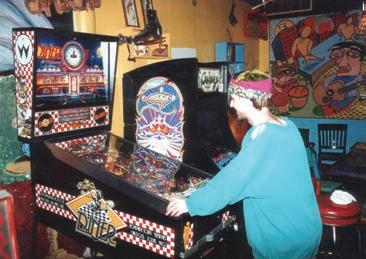
Page X
Page 4
Othe month that I had nothing scheduled for the morning, so I tried to catch up on sleep,” he told the Chronicle.

ringing but ignored it in favor of a few more minutes of sleep.
thing needed his attention.
Lenda nus dolorum re pro mi, cuptati ntibus.

Page 5
Page X

“I had a system with my chief of staff, Dan Gilman,” Peduto said. “If there was something I had to be aware of, he would immediately call twice and I would always pick up.” When Peduto answered the call, Gilman began uttering words such as “active shooter,” “Tree of Life” and “multiple casualties.”
Those words hit Peduto like “a ton of bricks,” he said.
He told Gilman he would call right back, hung up and said a prayer.
Gilman picked up Peduto, and the two reached the Tree of Life building as police officers were arriving from throughout Greater Pittsburgh. The scene was chaotic, Peduto said.
“The call had been put out that every available officer was to report to the Tree of Life,” he said. “The cars were coming from every
One of Peduto’s first acts was to reassign the officer in charge of the incident. When the mayor arrived, Pittsburgh police Cmdr. Jason Lando, from Zone 5, was serving as incident commander. When Peduto learned that Lando’s grandfather regularly attended services at Tree of Life, he put Pittsburgh fire Chief Darryl Jones in charge until then-Deputy Chief of Police Thomas Stangrecki arrived. Eventually, Public Safety Director Wendell Hissrich, who Peduto said “must have set a speed record,” arrived and took command.
Peduto then began working to safeguard those beyond the Tree of Life building.
“We were facing a situation that might be happening in other temples or shuls,” he said. “We began a phone chain to notify every synagogue in the city of what was happening to get them to lock their doors.”
Only after this process began did Peduto realize it was Shabbat. Instead of telephone calls, he sent officers to every synagogue in the area, instructing them to stay on site for added protection.
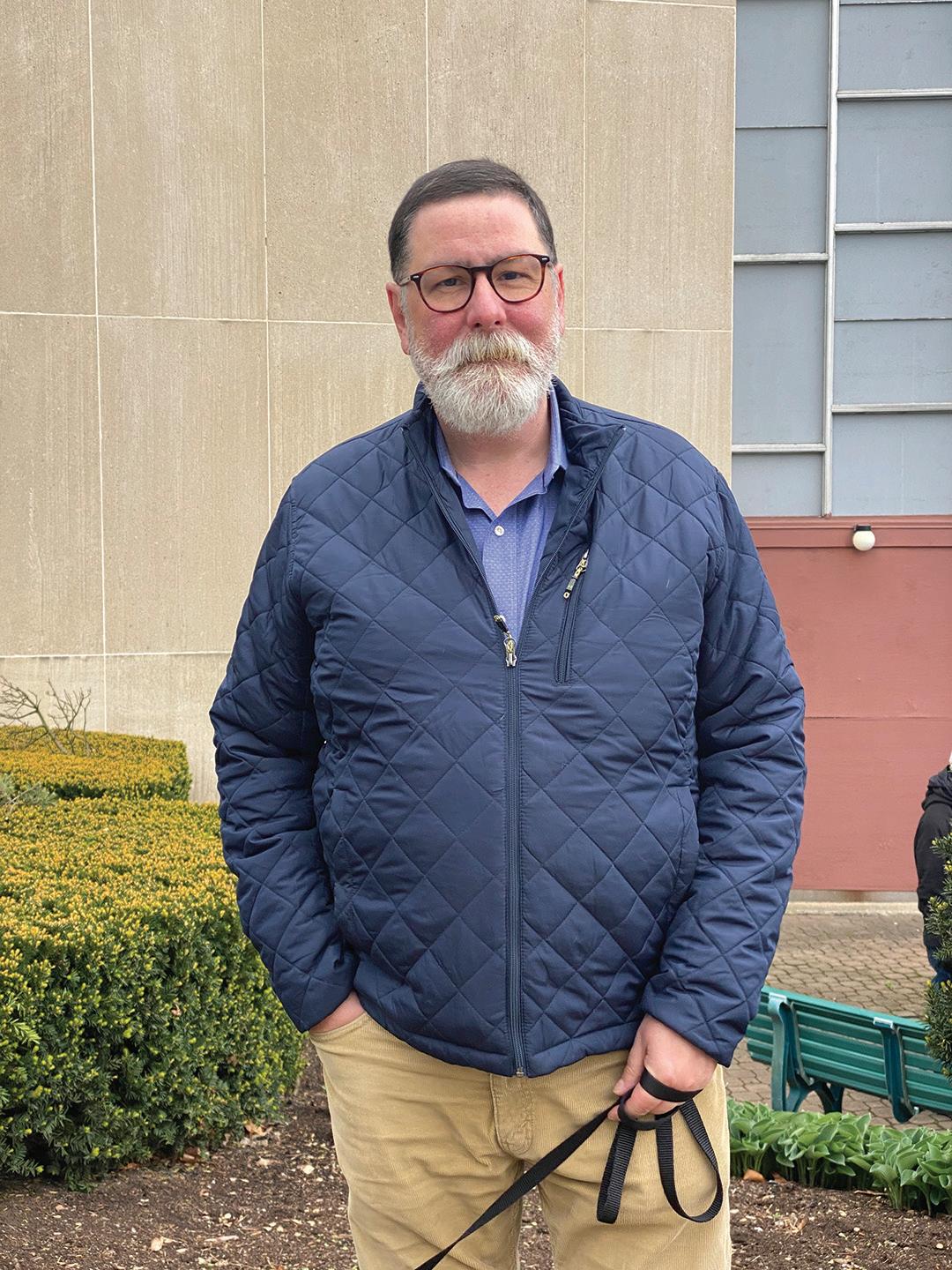
Peduto had learned from conversations
Please see Peduto, page 10
By Torsten Ove | Contributing Writer

As jury selection dragged on at the federal courthouse last Friday, the director of the 10.27 Healing Partnership met with reporters across the street to discuss the laborious task of picking average citizens to decide the fate of the man accused of murdering 11 worshippers at the Tree of Life synagogue building in 2018.
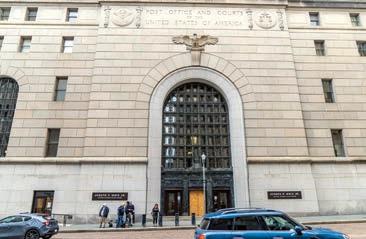
“I am impressed with the thoroughness of this process,” said Maggie Feinstein, “and the delicate care that everybody from the judge to the two sides of the legal teams takes in honoring the dignity of all the potential jurors.”
Please see Trial, page 10
NOTEWORTHY
The secret Jewish history of Pittsburgh pinball
May 5, 2023 | 14 Iyar 5783 Candlelighting 8:02 p.m. | Havdalah 9:06 p.m. | Vol. 66, No. 18 | pittsburghjewishchronicle.org $1.50
your eye on PittsburghJewishChronicle ‘A Passage to Sweden’ FILM Old-fashioned coffee cake Blue Ribbons: A symbol of solidarity LOCAL FOOD
keep
Former Mayor Bill Peduto in front of the Tree of Life building on April 23
Photo by Toby Tabachnick
Members of the media stand outside of the federal courthouse on Grant Street, downtown, on Monday, April 24, ahead of the start of the federal death penalty trial for the man accused of killing 11 worshippers from three congregations at the Tree of Life synagogue building in 2018. Photo by Alexandra Wimley/Union Progress
Headlines
Getting to know: Mor Greenberg
— LOCAL —
By David Rullo | Sta Writer
Askating competition scheduled for Yom Kippur helped crystalize Mor Greenberg’s future.
The Australian, who grew up in a secular Jewish home in Sydney, spent most of her early years working toward the goal of representing her country in the Olympics. Her daily schedule — up at the crack of dawn to get ice time before school, a full day of studying, and then back to the rink for more skating, strength training, Pilates, ballet and even sports psychology before going to sleep and starting the entire process again — didn’t leave room for much else in her life.
Things slowly began to change when she was 11, and a friend slept over one night before an uncommon day off. The next morning, her friend said she had to go study for her bat mitzvah and asked Greenberg if she wanted to come.
Greenberg’s parents were already out for the day, so she joined her friend at a Chabad house and listened as the rebbetzin talked about the Jewish soul and how all people are on Earth for a purpose.
“I was blown away,” Greenberg recalled. “I was 11 and had never heard these types of deep concepts before.”
Greenberg’s parents, Israelis who immigrated with their family first to England and then Australia, had planned to take their daughter to Israel for a simple bat mitzvah and party. When she mentioned how she had spent her day and that she wanted to continue going to the Chabad house, they refused.
The subsequent friction in the house that arose whenever Greenberg would try a new Jewish ritual — keeping kosher on Shabbat, for instance — caused the preteen to begin a journey
of subterfuge and personal discovery. While other girls her age were hiding their first cigarette or their conversations with boys on the phone, Greenberg hid her religious observance.
“I wouldn’t tell them (her parents) what I was doing,” she said. “I had printouts of the siddur I would hide in my closet. On Friday nights, when my parents would go with friends for Shabbat dinner, I would make excuses why I couldn’t go because I didn’t want to drive. So, I would sit at home alone in the dark on a Friday night because I didn’t want to turn on a light. It was very lonely and very difficult.”
She continued to learn about the religious aspects of Judaism on her own and made compromises that sometimes left her conflicted — she would drive to a skating competition on Shabbat, she said, but not listen to music — until, at the age of 16, she crossed a Rubicon.
“National championships were on Yom Kippur, and I knew then I had to make a decision,” she said.
Greenberg told her coach that she wouldn’t be skating that day, essentially ending her career.
In the meantime, the proverbial cat was out of the bag about Greenberg’s growing Jewish observance. Her parents, she said, were relieved because it allowed honest conversations. Eventually, they even asked if she would
like to go back to the Chabad center.
Still, some decisions required Greenberg to show firm resolve.
While her parents wanted her to attend college, Greenberg wanted to attend religious study in Israel. Greenberg drew the winning hand when, on a Birthright trip, she called her parents and said she was staying to study in Israel. They weren’t happy, but their nowadult daughter was already in the Jewish state.
After some time in Israel, Greenberg continued her studies in Melbourne, Australia. Eventually, her relationship with her parents healed.
Greenberg married and had five children, finished a communications degree, moved to the United States and settled in Pittsburgh in 2013.
After working at the Friendship Circle of Pittsburgh, eventually becoming the director of operations and managing a staff of about 20 people, Greenberg took time off in 2018. During her downtime, she began writing the blog “Sugar-Free Coating.” The idea, she said, was to present an alternative to typical Instagram posts where people show only the best parts of their lives. Her goal was to show the messy side of life while pointing to the commonality shared by everyone — single women and moms, religious women and secular Jews, political conservatives and those on the left.
After a while as a stay-at-home mom, Greenberg decided to return to work outside the home. As fate would have it, Pittsburgh-based political consulting firm ColdSpark, which claimed Republican presidential candidate Nikki Haley as one of its clients, was hiring.
Greenberg is now the company’s director of public affairs and works with a range of clients, many of whom are vocal supporters of Israel and Judaism. Notably, she represents the Orthodox Union, which allows her to flex several muscles: her joy of communications, love of Israel and passion for Judaism.
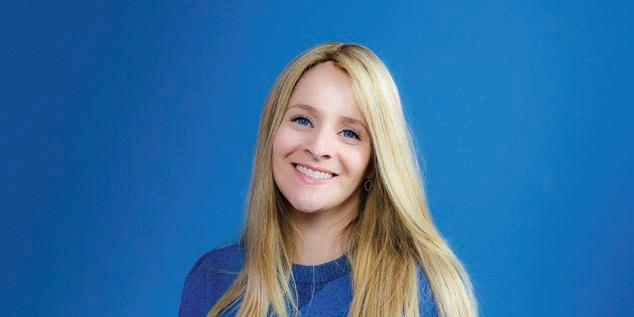
She’s combined those interests in Pittsburgh with one of ColdSpark’s newest clients: Jim Hayes, a Republican hoping to oust Rep. Summer Lee (D-District 12) in next year’s congressional elections.
Hayes, she said, understands the importance of a strong Israel and is someone the Jewish community can rally behind.
The congressional hopeful, she said, can bridge the gap between the right and left.
“He’s from Pittsburgh, his dad was a steelworker, his son was a victim of gun violence,” Greenberg said. “He’s an economist. He would vote for the policies that would help to improve the economy.”
And, vital to Greenberg, he would support Israel, something she doesn’t see in Lee.
“I have nothing against Summer Lee,” Greenberg said. “I’ve heard she’s really embracive of the Jewish community. I disagree with voting against a resolution that underlines the strength between the American–Israeli relationship, because that’s important to regional stability and for the Jewish people. Politics isn’t personal, but it does come down to policy.”
It doesn’t matter where you stand on Israel, Greenberg said, but “it’s an inarguable fact” that the tiny democracy is disproportionally scrutinized. The United Nations General Assembly passed 15 resolutions in 2022 criticizing Israel, versus 13 against all other nations, including Korea, Iran and Russia, she noted.
“There are enough people criticizing Israel,” she said. “We should support it locally.”
In the end, it’s the Jewish people and Judaism that matter to Greenberg.
“I don’t want to put up a barrier between myself and other Jewish people if they don’t agree with me,” she said. “Let’s promote Jewish unity above all,” she said. PJC
David Rullo can be reached at drullo@ pittsburghjewishchronicle.org.
5915 Beacon St., 5th Floor Pittsburgh, PA 15217
Main phone number: 412-687-1000
Subscriptions: 410-902-2300, ext. 1
SUBSCRIPTIONS subscriptions@pittsburghjewishchronicle. org
410-902-2300, ext. 1
TO ADVERTISE advertising@pittsburghjewishchronicle.org
724-713-8874
EDITORIAL DEPARTMENT
Email: newsdesk@pittsburghjewishchronicle.org
BOARD OF TRUSTEES
Evan H. Stein, Board Chair
Gayle R. Kraut, Secretary
Evan Indianer, Immediate Past Chair
Gail Childs, Dan Droz, Malke Steinfeld
Frank, Seth Glick, Tammy Hepps, Cátia Kossovsky, David Rush, Charles Saul
GENERAL COUNSEL
Stuart R. Kaplan, Esq.
Jim Busis, CEO and Publisher 412-228-4690 jbusis@pittsburghjewishchronicle.org
EDITORIAL
Toby Tabachnick, Editor 412-228-4577 ttabachnick@pittsburghjewishchronicle.org
Andy Gotlieb, Contributing Editor
Adam Reinherz, Staff Writer 412-687-1000 areinherz@pittsburghjewishchronicle.org
David Rullo, Staff Writer 412-687-1047 drullo@pittsburghjewishchronicle.org
ADVERTISING
Phil Durler, Senior Sales Associate 724-713-8874 pdurler@pittsburghjewishchronicle.org
PRODUCTION
Jeni Mann Tough Production Manager
Carl Weigel Art/Production Coordinator Subscriptions subscriptions@pittsburghjewishchronicle.org 410-902-2300, ext. 1
Published every Friday by the Pittsburgh Jewish Publication and Education Foundation 5915 Beacon St., 5th Floor Pittsburgh, PA 15217 Phone: 412-687-1000


POSTMASTER:
Send address change to PITTSBURGH JEWISH CHRONICLE, 5915 BEACON ST., 5TH FLOOR PITTSBURGH, PA 15217
(PERIODICAL RATE POSTAGE PAID AT PITTSBURGH, PA AND AT ADDITIONAL MAILING OFFICES)
USPS 582-740
Manuscripts, letters, documents and photographs sent to the Pittsburgh Jewish Chronicle become the property of this publication, which is not responsible for the return or loss of such items.
The Pittsburgh Jewish Chronicle does not endorse the goods or services advertised or covered in its pages and makes no representation to the kashrut of food products and services in said advertising or articles. The publisher is not liable for damages if, for any reason whatsoever, he fails to publish an advertisement or for any error in an advertisement. Acceptance of advertisers and of ad copy is subject to the publisher’s approval. The Pittsburgh Jewish Chronicle is not responsible if ads violate applicable laws and the advertiser will indemnify, hold harmless and defend the Pittsburgh Jewish Chronicle from all claims made by governmental agencies and consumers for any reason based on ads appearing in the PittsburghJewish Chronicle

2 MAY 5, 2023 PITTSBURGH JEWISH CHRONICLE PITTSBURGHJEWISHCHRONICLE.ORG
Mor Greenberg Photo courtesy of Mor Greenberg
A small symbol of solidarity for the synagogue shooting trial: Blue ribbons
—
By Adam Reinherz | Sta Writer
The simplest of actions is symbolizing the deepest of bonds. While survivors and loved ones of the victims of the Pittsburgh synagogue shooting endured the first week of trial, the public demonstrated its support by donning blue ribbons. The trial is expected to last several months.
Margie Ruttenberg, a volunteer with the 10.27 Healing Partnership, said the idea of wearing a ribbon was spurred by countless people asking how they could help during this period.
“We immediately thought about the Stronger Than Hate movement, the lawn signs, the billboards, T-shirts, the pride that came with being part of something bigger than oneself,” Ruttenberg said.
“We know that everyone feels differently. And for many, standing in solidarity is a powerful way to do something,” said Emery Malachowski, outreach coordinator at the 10.27 Healing Partnership.
Ruttenberg and Malachowski announced the blue ribbon campaign on April 27 outside the Squirrel Hill Flower Shop on Murray Avenue. Katy Levin, the shop’s
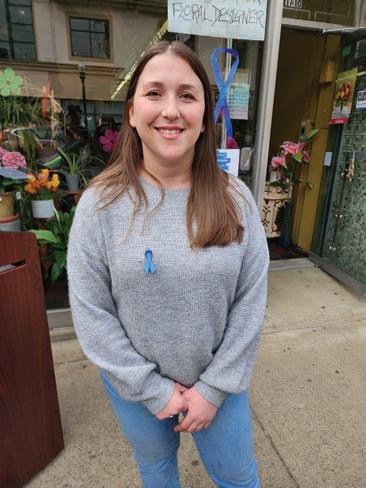

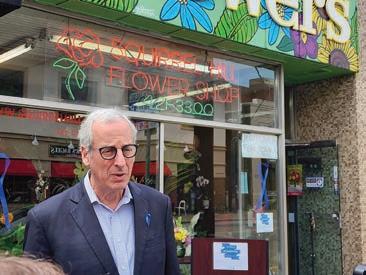
manager, is the third generation of her family to work at the store.
“I’m a part of a neighborhood and a city where people care about each other, and I’m here today to show that our community stands together,” she said.
With a small blue cloth pinned to her sweater, Levin said she grew up at the Tree of Life synagogue and knew several of the victims killed there on Oct. 27, 2018.
“It’s important to me to show solidarity with the families and community members who are going through the trial,” Levin said.
Along with demonstrating unity, the blue ribbons are a statement against antisemitism and hate.
“Antisemitism is something that the Jewish community has always faced, but it shouldn’t be that way,” Levin said. “I think hate is a word that shouldn’t be in our vocabulary, and I’m proud to say that hate is wrong and that antisemitism is wrong and that together as a community we are stronger than hate.”
Malachowski and Ruttenberg hope the campaign generates a wide following.
“The goal is nobody walks around Squirrel Hill without seeing a blue ribbon,”
Malachowski said.
“I want everyone with ties to Pittsburgh, everyone around the country to wear a blue ribbon,” Ruttenberg said.
Minutes later, state Rep. Dan Frankel (D-Allegheny) affixed a blue ribbon to his lapel and announced his intention to bring ribbons to Harrisburg for fellow representatives.
“It’s a very emotional time for everybody, so to have a way to identify and show support — even in this nice way with a ribbon,” he said, “it mirrors what we’re trying to do legislatively.”
On Monday, as the trial against the accused Pittsburgh synagogue shooter began with jury selection, Frankel unveiled new antihate crime legislation at the Pennsylvania State Capitol complex.
Hate crimes are an “epidemic in the state of Pennsylvania, as well as the country, and we saw what hate did to our community,” Frankel told the Chronicle.
“When I go around the state, a lot of people know that I come from Squirrel Hill and they always ask me, ‘What are you going to do about this?’ So, here we are, we are trying to do something about it,” he said. “Seeing the kind of solidarity
within our own community helps inspire me and others to go forward with this work.”
Before offering passersby blue ribbons, Malachowski said they are available for pickup at the 10.27 Healing Partnership inside the Jewish Community Center of Greater Pittsburgh, Squirrel Hill.
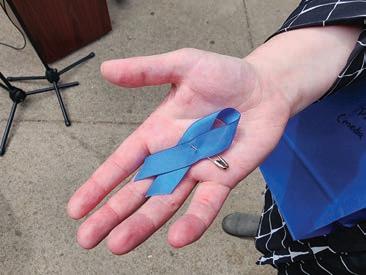
Additionally, she said, programs, drop-in counseling and “a safe space for those seeking support and connection” are available at the Healing Partnership five days a week.
“Oct. 27, 2018, deeply impacted this community,” she continued. “But within the same community that experienced the trauma, we can find healing and great resilience. Connection and community are key to building long-term resiliency and healing from trauma.” PJC
Adam Reinherz can be reached at areinherz@pittsburghjewishchronicle.org.
This story is part of ongoing coverage of the Pittsburgh synagogue shooting trial by the Pittsburgh Jewish Chronicle and the Pittsburgh Union Progress in a collaboration supported by funding from the Pittsburgh Media Partnership.
Uptick in online hate rhetoric as Pittsburgh synagogue shooting trial begins second week
Security officials have seen an increase in online hateful rhetoric as jury selection in the federal hate crime trial of the Pittsburgh synagogue shooter began its second week, according to Shawn Brokos, director of community security for the Jewish Federation of Greater Pittsburgh.
“With the start of the trial, we noticed right away an uptick in derogatory language,” she said.
The rhetoric was directed at both the Jewish community and law enforcement agencies that have assisted the community, she said. The posts indicated support for the man accused of murdering 11 Jews in the Tree of Life building on Oct. 27, 2018.
The language was found on multiple online platforms, Brokos said. Security officials are monitoring it, watching for signs of escalation.
“I was very pleased to see that our intelligence and law enforcement partners are monitoring this and everybody was on top of it,” she said. “The security platform we have in
place is working.”
While Brokos said she wasn’t surprised to see hateful language in support of the defendant as the trial began, she stressed that there are no specific threats directed against the Jewish community.
“It was language that was very offensive, definitely antisemitic, anti-law enforcement and in support of the defendant of the trial, but absolutely nothing threatening, no call to action,” she said. “It was a group of likeminded folks on different platforms discussing their support of the defendant’s actions.”
Brokos said she expects to see more of this type of rhetoric as the trial continues.
The Jewish community should remain vigilant, she said, but should not alter its daily activities.
“I am a big proponent that we need to live our lives, celebrate our faith, heritage and ethnicity,” Brokos said. “The second we stop doing that, then these like-minded individuals have won and that’s not OK — and it’s not who we are in Pittsburgh.” PJC
PITTSBURGHJEWISHCHRONICLE.ORG PITTSBURGH JEWISH CHRONICLE MAY 5, 2023 3
Headlines
—
LOCAL — — LOCAL
State Rep. Dan Frankel shares his intention to bring blue ribbons to the State Capitol building.
Photo by Adam Reinherz
Blue ribbons are available at the 10.27 Healing Partnership in the Jewish Community Center of Greater Pittsburgh.
Photo by Adam Reinherz
From left: Katy Levin, Emery Malachowski and Margie Ruttenberg participate in an April 27 announcement outside the Squirrel Hill Flower Shop.
Photo by Adam Reinherz
Katy Levin, manager of Squirrel Hill Flower Shop, wears a blue ribbon.
Photo by Adam Reinherz
David Rullo
“Seeing the kind of solidarity within our own community helps inspire me and others to go forward with this work.”
−REP. DAN FRANKEL
Headlines
Pittsburgh synagogue shooting survivor, security officials stress preparedness at threat training session
— LOCAL —
By Adam Reinherz | Sta Writer
During his bar mitzvah speech 52 years ago, Stephen Weiss taught members of Congregation Poale Zedeck about 74 biblical commandments.
On April 30, Weiss returned to the Squirrel Hill synagogue to teach one more: survival.
As congregants lined the social hall for an evening dedicated to active threat training, Weiss recalled a similar exercise six years ago.
It was September 2017, and Weiss was teaching at the Tree of Life*Or L’Simcha religious school. Then-Jewish Federation of Greater Pittsburgh Community Security Director Brad Orsini insisted educators attend a session regarding active shooter preparedness.
“My first thought,” Weiss said, “was why do we need to worry about this? This is such a waste of time.”
Weiss reluctantly participated. He watched footage from a 2017 attack at the Fort Lauderdale–Hollywood International Airport. He saw people crouching behind empty luggage carts. And he listened to Orsini describe the futility of “hiding in plain sight.”
A year later, Weiss stood in the back of the Pervin Chapel inside Tree of Life’s synagogue during Shabbat services. It was Oct. 27, 2018.
“We were ready to say Kaddish d’Rabbanan,” he recalled. “There was a loud crashing noise down by the main entrance area.”
Weiss described the clamor as if “a tray of glasses” had fallen.
“I’m a person that has been shooting for, I don’t know, 40 years,” he said. “I recognize the sound of gunfire. I did not recognize that sound.”
Weiss stood at the doorway. Rabbi Jeffrey Myers finished reciting kaddish.
“There was a series of gunshots, four shots,” Weiss said. “And as I’m standing there, I’m watching shell cases bounce across the floor in front of me. The first thought I had was, this can’t be happening here.”
Weiss headed toward the chapel’s side windows. He said Myers told everyone to get down.
“As I started to get down next to that very back row, I remembered a video that Brad [Orsini] had shown us,” Weiss said. “I got back up, ran to the front area by the bimah — and on the bimah itself there were exit doors. I went up onto the bimah, up and out one of those exit doors.”
Weiss recalled other details. He mentioned the names of fellow worshippers, the roles they had, the positions he held at Tree of Life and a calendrical miracle: Although junior congregation was held at the synagogue three weeks every month, it wasn’t scheduled for Oct. 27.
“There were four of us that got out of that room unscathed,” Weiss said. “One was wounded. Everybody else was killed. The probability is, if I had got down to hide next
to that bench, I probably would have been the 12th victim.”
Seven members of Tree of Life, three members of New Light Congregation and one member of Congregation Dor Hadash were killed that day: Joyce Fienberg, Richard Gottfried, Rose Mallinger, Jerry Rabinowitz, Cecil Rosenthal, David Rosenthal, Bernice Simon, Sylvan Simon, Daniel Stein, Melvin Wax and Irving Younger.
The September 2017 active threat session Weiss attended made all the difference, he said. Without it, “I would have got down by that back pew.”
Four-and-a-half years after the Pittsburgh synagogue shooting, Orsini is the senior national security advisor at Secure Community Network. Shawn Brokos, a former FBI crisis management coordinator who oversaw the bureau’s Oct. 27 response efforts, directs community security for Pittsburgh’s Jewish Federation.
Brokos led the April 30 session at Poale Zedeck. She covered the basics of run, hide, fight — a “national model” the Federation teaches to schools, organizations and congregations.

“Run means to evacuate away from danger if you can do so safely,” she said. “Hide means to secure in place, and find ways to protect yourself.” And though typically the “last resort,” fighting involves using “anything available,” she said. “Whether it’s a fire extinguisher or maybe a coffee cup, your goal is to attack that weapon and get the weapon away from the gunman.”
Reviewing the run, hide, fight protocol is “just one critical step in us keeping ourselves as protected as possible as a community,” Brokos said. “It’s up to all of us to go through this training. The more we do it, the more it becomes known to us, and we can respond much faster if there is a critical incident — because every second counts.”
Police typically respond to active shooter threats in three minutes, according to the FBI. Law enforcement arrived at the Tree of Life building less than two minutes after
receiving a call, Brokos said.
Weiss credited Myers with reporting the emergency and saving lives.
“My cell phone was locked in my car and my keys were in the office of the synagogue,” Weiss said. “I had no access. The rabbi was the first person on the phone calling 911 because he had his phone. So although it’s not traditional to carry a phone on Shabbat, at least he had one accessible.”
Poale Zedeck is an Orthodox congregation. In deference to halacha (Jewish law), staff, leaders and most members refrain from using electronics, including cellphones, on Shabbat.
When asked about negotiating the tension between encouraging people to carry cellphones on Saturdays and observing Shabbat, Brokos said, “There’s no perfect answer.”
She teaches “life saving,” she said, but also strives to “be very respectful of the religious tenets that go along with it.”
Installing BluePoint alerts has helped, the former FBI agent explained.
Designed to look like fire alarms, the alerts instantly notify emergency responders about an active threat. Along with pinpointing where the alert was pulled, the system causes bright blue bulbs to blink.
“So if you’re walking up for services and you see these, do not go into the building,” Brokos said.
To teach attendees how the system functions, Brokos asked participants to occupy various stations throughout the synagogue. As they did so, doors slammed shut. Red security bars prevented entrance or exit. Blue strobe lights flashed.
Joel Ungar, a longtime congregant who spends most Saturday mornings volunteering with Poale Zedeck’s security committee, stood in the back of the main sanctuary. After listening to instructions through an earpiece, Ungar told attendees that a system error had mistakenly informed police that an active threat was occurring.
In the interim, dozens of community members and law enforcement officials
received a message from BluePoint about a “weapons threat alert” at Poale Zedeck.
“Something failed along the way,” Brokos said. “It was through no fault of anybody at Poale Zedeck or the Jewish Federation.”
Several texts were sent to calm recipients. One message read “Poale Zedeck was a TEST!!!”
Another message apologized for “the major inconvenience and confusion” and explained that “further investigation” was underway.
The Federation is working to address the issue. Brokos said the exercise, though concerning, was valuable.
“It was a learning experience — not an experience any one of us wanted Sunday night before jury selection starts up again in the trial — but at least we know the system does work,” she said.
Eric Kroll, a law enforcement officer with 30 years of experience, stood beside Brokos and reiterated the importance of active threat training.
“This is a horrible subject to talk about, but it empowers them and empowers me,” he said. “It’s a way of healing.”
Like Brokos, Kroll was at the Tree of Life building on Oct. 27, 2018.
“It’s one thing to be part of an incident like that. It’s another to find a way to make a positive out of a horrible situation,” he said. “This is a positive response to it. Not everybody has to be afraid to come to services, or afraid if someone comes through the door because we’ve done everything we can to prepare.”
Kroll and Brokos both encouraged the community to attend training sessions.
“I look at it as a team,” Brokos said. “If you’ve got folks on the team who aren’t practicing, or who are just not showing up for practice, then that hurts all of us because … they’re not going to know what to do.”
There is a relationship between preparation and responsibility, Weiss said: “We have to rely on each other. One person being trained doesn’t do us much good.”
Fifty-two years before imploring members of Poale Zedeck to be prepared, he told those seated in the congregation’s pews about Parshat Ki Teitzei. That portion, Weiss said, has the most mitzvot of any in the Torah.
Among the 74 commandments recorded are instructions about removing stumbling blocks and obstacles from dwelling places, fulfilling utterances and building fences around roofs when erecting homes.
The final commandments in Ki Teitzei, Weiss recalled, concern Amalek, a group who — according to Jewish tradition — attacked the oldest Israelites while traveling in the desert.
In Hebrew, that passage is called “Zachor” (remember). PJC
Adam Reinherz can be reached at areinherz@pittsburghjewishchronicle.org.
This story is part of ongoing coverage of the Pittsburgh synagogue shooting trial by the Pittsburgh Jewish Chronicle and the Pittsburgh Union Progress in a collaboration supported by funding from the Pittsburgh Media Partnership.
4 MAY 5, 2023 PITTSBURGH JEWISH CHRONICLE PITTSBURGHJEWISHCHRONICLE.ORG
Shawn Brokos, director of community security for the Jewish Federation of Greater Pittsburgh, trains members of Congregation Poale Zedeck how to respond to an active threat situation.
Photo by Alexandra Wimley/Union Progress
The secret Jewish history of Pittsburgh pinball
By David Rullo | Sta Writer
Tim Fabian first became interested in pinball as a kid growing up in Princeton, New Jersey. He brought his love of the game with him when he moved to Pittsburgh to attend the Art Institute in the late ’70s.
Fabian initially lived at a rooming house on Northumberland Avenue where he met his wife, then moved with her to an apartment above the former Silberberg Bakery on Murray Avenue.
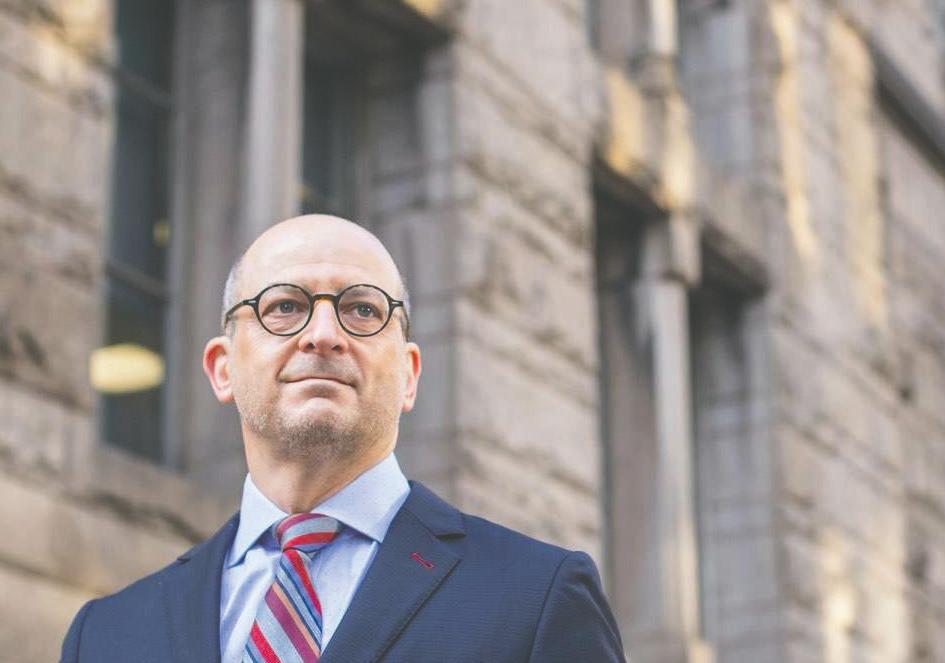
The pair and their friends often found themselves at a Squirrel Hill landmark, The Squirrel Hill Café — also known as “The Cage” — or The Corner Pocket on the corner of Hobart Street and Murray Avenue.
“It was cheaper to go drink and play pinball at The Cage than it was to eat at the house,” he laughed.
Fabian, a photographer, was one of the founders of Silver Eye Center for Photography, which by the late ’80s was located on East Carson Street on the city’s South Side. He is just one link in a little-known connection between Pittsburgh’s Jewish community and the city’s pinball history.
Like others on the South Side at the time, Fabian was a regular at the Beehive Coffeehouse, which opened in 1991 and soon became a central hub for pinball.
Beehive co-owner Steve Zumoff grew up in Lemoyne, Pennsylvania, across the Susquehanna River from Harrisburg. Sometime between the ages of 8 and 10, he discovered pinball at a corner restaurant and market.
“I always liked pinball,” he said.
The first game that caught his attention was “Black Knight.” Zumoff fell in love with the mechanical and analog nature of the game, he said.
“It’s more of a skill game versus video games,” he said. “Video games require skill, but they’re programmed games.”
Zumoff moved to Pittsburgh to study at the University of Pittsburgh and brought his love of pinball with him, often playing at Doc’s Place on Walnut Street in Shadyside.

After graduation, Zumoff and his business partner, Scott Kramer, opened the Beehive. The café was one of the first coffeehouses in Pittsburgh and catered to the artistic community that found a home on the South Side.
From the beginning, pinball played a large part in the café’s activities.
“We started with our first game — I think it was Police Force — and then we had two, and that was in the regular coffeehouse,” Zumoff said. “When we got more space I wanted to have a pinball room, so we had six games in the back and that was the start of the pinball universe. Pinball had a big resurgence and Pittsburgh had a big presence in the pinball world.”
Pittsburgher Dale Lazar provided the coffeehouse with its games, Zumoff said.
Lazar is better known these days as a photographer, capturing images at many Union for Reform Judaism events, but in the ’90s he was a local supplier of pinball games.
A third-generation owner, Lazar joined the business — a jukebox supplier that added pinball games to its offerings — in the late ’70s, after working as a teacher.
“The success of pinball at the Beehive was remarkable,” Lazar said. “I would suspect that, at the time, it was both the most popular venue and record-setting in terms of revenues for pinball.”
His relationship with Zumoff, he said, was unique.
“Pinball games are not reliable,” Lazar said. “There’s a lot of service and Steve was able to do some of that basic service, so he had keys to the games to reduce downtime and increase revenue. Prior to meeting Steve, I never thought I would have given the keys to anybody, but he was so uniquely special and committed and exuded incredible integrity that it was very easy to give him keys to the games.”
The games proved so popular at the South Side location that when Zumoff and Kramer opened a second location at the old Kings Court Theater on Forbes Avenue in Oakland, they made sure to include pinball there as well.
“It’s hard to believe,” Lazar said, “but we carried the games up the steps. Now I can’t even carry a ball, but he had designed a special room.” Eventually, Zumoff branched out and partnered with Kevin Martin to help create a pinball league in the city.
“I was very much a player. I always have been,” Martin said. “I met the Pittsburgh crew in 1993 when I was in Chicago at the AMOA tournament. Steve was a big part of that, as well as Dave Stewart, who was an electrical engineering student.”
As luck would have it, Martin began dating a woman from Pittsburgh, and he moved to the city. He recalled that Zumoff and Stewart were working then to bring competitive pinball to Pittsburgh.
“Dave was pushing hard,” Martin said. “He originally created the Three Rivers Pinball Association and then later the Steel City Pinball Association, but I might have the order reversed. Now there’s a thriving scene with all sorts of leagues and locations. At the time, the two Beehives were the only place to play.”
Martin was the founder of Pair Networks, a large host of internet websites. It allowed him to follow his passion, which was pinball.
He started to create events with Zumoff, first at the Beehive, later at a hotel in Oakland, before moving them to the Best Western at Parkway Center. The competitions proved a hit.
“We had the top floor and could fit about 25 or 30 machines,” Martin said. “The air conditioning couldn’t keep up. The elevators were overwhelmed. It was hot and messy, and things were breaking down all the time,
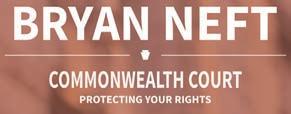
but people loved the format. We had a huge turnout and trouble shutting down by 2 a.m. or 3 a.m. each day.”
When Martin heard New York City’s Broadway Arcade owner and founder of the Professional and Amateur Pinball Association, Steve Epstein, was retiring, he bought the league name.
Epstein is credited with popularizing the concept of pinball leagues and tournaments, so the name carried a certain weight, Martin said.
In the early 2000s, Martin bought a space in Carnegie that contained more than 200 pinball games. A week after the first tournament, PAPA 7, Carnegie experienced extreme storms which flooded Martin’s location.
Zumoff and Martin moved the tournament to the David Lawrence Convention Center. The tournament was so popular, Martin said, that it ranked third in attendance after the Home & Garden Show and the Auto Show.
Martin started a nonprofit, Replay FX, that ran the tournaments and was focused on securing pinball for future generations.
“We were really punching above our weight,” he said.
COVID changed all that.
The organic growth that started at the Beehive in the late ’90s, which led to the creation of a pinball league and record-breaking tournaments, was stopped in its tracks by the virus.
“The first Replay FX event had 3,000 people, and four years later we had 30,000,” Martin said. “You just can’t start that cold again.”
And while the large tournaments with tens of thousands of people may have ended, Pittsburgh’s connection to pinball is as strong as ever. Kickback Pinball Café in Lawrenceville and Pinball Perfection in the North Hills are just two locations Pittsburghers can visit to hit some flippers.

As for Fabian, he’s taken his love of the game home. He now owns a 1994 edition of Bally’s Popeye Saves the Earth, bought for him by his wife, Karen.
“It was the first multi-level with flippers game at the time,” he said with pride. PJC
at drullo@ pittsburghjewishchronicle.org.

PITTSBURGHJEWISHCHRONICLE.ORG PITTSBURGH JEWISH CHRONICLE MAY 5, 2023 5 Headlines — LOCAL — PaidforbyVoteNeft Let's put a mensch on the bench! BryanwasbornandraisedinPittsburgh-heisthesonofasmall businessmanandalawyerwhostartedhercareerasahome economicsteacher.Bryanhasspentmorethan30yearsasa lawyerandleaderinthelegalprofession. TheSupremeCourtoftheUnitedStatesmadeitclearwhenit overturnedRoev.Wadethatindividualrightswillbelefttothe statestodetermine.TheCommonwealthCourtiscriticalto protectingtheserights. BryanNeft.com /BryanNeft *RecommendedforElection* bythePennsylvaniaBarAssociation *HighlyRecommended* bytheAlleghenyCountyBarAssociation ProtectingYourRights Vote May 16
David Rullo can be reached
Tim Fabian is the proud owner of Popeye Saves the Earth. Photo by Tim Fabian
Pinball was a popular attraction at both Beehive Coffeehouse locations, started by Scott Kramer and Steve Zumoff.
Photo by Scott Kramer
Submit calendar items on the Chronicle’s website, pittsburghjewishchronicle.org. Submissions also will be included in print. Events will run in the print edition beginning one month prior to the date as space allows. The deadline for submissions is Friday, noon.
SUNDAY, MAY 7
The Scandinavian Society of Western Pennsylvania presents a screening of “Passage to Sweden,” telling the largely unknown story of how thousands of Jews from Scandinavia and Budapest were rescued during World War II, followed by a question and answer with director Suzannah Warlick. $12. Viewings: 2:30 p.m. and 4:30 p.m. Row House Cinema, 4115 Butler Street. For tickets, visit rowhousecinema.com.
SUNDAYS, MAY 7 – DEC. 3
Join Chabad of Squirrel Hill for its Men’s Tefillin Club. Enjoy bagels, lox and tefillin on the first Sunday of the month. 8:30 a.m. chabadpgh.com.
SUNDAYS, MAY 7 – DEC. 17
Join a lay-led online Parashah study group to discuss the week’s Torah portion. No Hebrew knowledge needed. The goal is to build community while deepening understanding of the text. 8:30 p.m. For more information, visit bethshalompgh.org.
MONDAY, MAY 8
Celebrate Israel’s 75th with Temple Sinai. Author and journalist Andrew Lawler will be on site to discuss his book “Under Jerusalem: The Buried History of the World’s Most Contested City” about the secret world under Jerusalem. 7 p.m. Free. templesinaipgh.org/ programs-events.
MONDAYS, MAY 8, MAY 15
Understanding the Torah and what it asks of us is one of the most important things a Jew can learn. But most Torah classes begin in Genesis and never finish the first book. If you want a comprehensive overview of the whole Torah, Torah 1 is the course for you. In the first year of this two-year Zoom course, Rabbi Danny Schi will teach Genesis, Exodus and the first half of Leviticus. In the second year, he will complete Leviticus and cover Numbers and Deuteronomy. $225. 9:30 a.m. foundation. jewishpgh.org/torah-1.
MONDAYS, MAY 8 – MAY 22
We Jews have an array of texts and making sense of them is not easy. In the six-part series “The Jewish Text Puzzle,” Rabbi Danny Schi will put the pieces of the “text puzzle” into one coherent picture so that the place of Torah, Tanakh, Talmud, Midrash, Responsa and Kabbalah, as well as many other sources, can be easily understood. Schi will provide a historical context that will explain the significance of our various texts to Judaism. 7 p.m. $85. Rodef Shalom Congregation, 4905 Fifth Ave. jewishpgh.org/event/the-jewish-text-puzzle.
MONDAYS, MAY 8 – DEC. 18
Join Congregation Beth Shalom for a weekly Talmud study. 9:15 a.m. For more information, visit bethshalompgh.org.
TUESDAY, MAY 9
In “Israel Literature as a Window to Israel Society,” Rabbi Danny Schi will facilitate an encounter with Israeli society through the pens of Israel’s leading writers, discovering voices that are original, contemporary and honest. This 10-part Melton course takes you on a literary journey o ering a fresh examination of the ever-relevant issues faced by Israeli writers. Together, learners will read poetry and prose, gaining insights into the Jewish national psyche. 9:30 a.m. $160. jewishpgh.org/event/ israeli-literature-as-a-window-to-israelisociety/2023-02-07.
Join Chabad of the South Hills for a Lag BaOmer community BBQ. Enjoy flame-grilled kosher favorites including burgers, hot dogs and all the trimmings,
as well as salads, drinks and s’mores. $18 per person; $36 per family. 5 p.m. 1701 McFarland Road. chabadsh.com/bbq.
TUESDAYS, MAY 9 – DEC. 19
Join Temple Sinai for a weekly Talmud class with Rabbi Daniel Fellman. Noon. On site and online. For more information and for the Zoom link, contact Temple Sinai at 412-421-9715.
Join Women of Temple Sinai for Yoga at Temple Sinai a relaxing class taught by certified yoga teacher Bre Kernick. All levels welcome. No experience required. Ages 16 and older. 7 p.m. $15 a session. templesinaipgh.org/programs-events.
WEDNESDAYS, MAY 10 – MAY 24
In the 10-part Zoom course, “Sacks: To Heal a Fractured World,” Rabbi Danny Schi will explore “To Heal a Fractured World,” Rabbi Jonathan Sacks’ book on the nature of Jewish responsibility for the broader world. Students will be invited to read this pivotal book and to discuss its contents in order to arrive at a better understanding of the views of Rabbi Sacks on the goals and vision of Judaism. 9:30 a.m. $145 for all 10 sessions. jewishpgh.org/event/sacks-toheal-a-fractured-world/2023-02-2.
Registration is open for “Melton Core 1: Rhythms and Purposes of Jewish Living.” This 25-lesson course will take you through the year’s cycle — the life cycle traditions and practices that bind us together. Explore not just the what is and how is of Jewish living, but the why is that go with them. 7 p.m. $300 per person, per year (25 sessions), includes all books and materials. Virtual. foundation.jewishpgh.org/ melton-core-1.
Chabad of the South Hills presents the new JLI course “Jewpernatural: Signs, spirits and superstition in Jewish belief.” The course probes the Talmud, Jewish philosophy and Kabbalah to provide Jewish perspectives and guidance to help understand mysterious topics like the meaning of dreams; the existence of angels, demons, and extraterrestrials; and the power of the evil eye. 7:30 p.m Chabad of the South Hills. chabadsh.com.
WEDNESDAYS, MAY 10 – DEC. 20
Join AgeWell for an intergenerational family dynamics discussion group. Whether you have family harmony or strife, these discussions are going to be thought-provoking and helpful. Led by intergenerational specialist/presenter and educator Audree Schall. Third Wednesday of each month. Free. 12:30 p.m. South Hills JCC.
WEDNESDAYS, MAY 10 – DEC. 27
Bring the parashah alive and make it personally relevant and meaningful with Rabbi Mark Goodman in this weekly Parashah Discussion: Life & Text 12:15 p.m. For more information, visit bethshalompgh. org/life-text.
Temple Sinai’s Rabbi Daniel Fellman presents a weekly Parshat/Torah portion class on site and online. Call 412-421-9715 for more information and the Zoom link.
MONDAYS, MAY 15, JUNE 12
Join the Women of Temple Sinai for Make ‘n’ Eat Monday Nights — A Year of Spices. The instructor will lead students in making a meal so everyone can eat together and taste the featured spice. 6 p.m. $15. templesinaipgh.org/event/spicecooking.html.
TUESDAY, MAY 16
Chabad of Squirrel Hill presents an Evening of Celebration honoring Robert Mallet. 6:30 p.m. $75/per person. Schenley Plaza (outdoor tent). chabadpgh.com.
THURSDAY, MAY 18
Classrooms Without Borders presents a post-film discussion of “Air Born” with Liat Eini-Netzer and Avi Ben-Hur. 3 p.m. eventbrite.com/e/post-film-discussionair-born-tickets-566782861797.
Join Classrooms Without Borders and its partners as they explore the multifaceted discipline of Holocaust studies through unique and previously unexplored lenses. This session will look at “Holocaust Cinema: How ‘A Film Unfinished’ Questions Archival Footage.” 2 p.m. cwbpgh.org/event/the-holocaust-asan-interdisciplinary-tapestry-6.
Join the JCC Bu alo for monthly virtual readings as part of the Jewish Poetry Series. Hosted by Philip Terman and Baruch November. Each month will feature di erent Jewish poets reading selections of poems that include but are not limited to Jewish themes, values and ideas. 7 p.m. Free and open to the community. jccbu alo.org/events/2023/02/09/arts-and-culture/ virtual-jewish-poetry-reading-series.
SUNDAY, MAY 21
Join Classrooms Without Borders for a Talking Memory program marking the 80th anniversary of the Warsaw Ghetto Uprising. 2 p.m. cwbpgh.org/event/talkingmemory-program-marking-the-80th-anniversary-of-thewarsaw-ghetto-uprising.
SUNDAYS, MAY 21, JUNE 11 AND SEPT. 10
Join Congregation Beth Shalom for “Toward Friendship and Discovery: Conversations Between Christians and Jews” as they read portions of “The Bible with and Without Jesus” together in small interfaith groups. The program is limited to 50 Jewish and 50 Christian participants. Child care will be provided. All food o erings will be kosher or otherwise labeled for mutual comfort. Registration is required. $100/per person. BethShalomPgh.org/Interfaith-Program-2023.
MONDAY, MAY 22
Chabad of the South Hills presents its Women’s Spring Event with guest speaker Gwyn Riddle. Riddle will present “A Letter from 1926,” one
woman’s incredible journey. There will also be a tablescaping demo. Fresh salad bar and desserts. 7 p.m. $25 before May 18; $30 after May 18. The event address will be given upon registration. chabadsh.com/spring.
TUESDAY, MAY 23
Chabad of the South Hills presents a pre-Shavuot seniors luncheon and presentation focused on finding gratitude in everyday life by Pathways Wellness Program. 1 p.m. $5 suggested donation. Chabad of the South Hills, 1701 McFarland Road. chabadsh.com
Join Chabad of Squirrel Hill for “A Taste of Shabbat,” a women’s evening of food, fun and learning, featuring a cheesecake demo. 7 p.m. $15 1700 Beechwood Blvd. chabadpgh.com/cheesecake.
FRIDAY, MAY 26
Hear the Ten Commandments and enjoy a dairy dinner and ice cream party with Chabad of Squirrel Hill at its Shavuot Party. 5 p.m. Free. 1700 Beechwood Blvd. chabadpgh.com.
THURSDAY, JUNE 1
Join local clergy from Jewish and Christian backgrounds for the Christian Jewish Dialogue, a monthly discussion exploring topics of similarities and di erences. Noon. Rodef Shalom Congregation. rodefshalom.org.
SUNDAY, JUNE 4
Join the Jewish Federation of Greater Pittsburgh for an exciting Partnership2Gether online film club that brings together people from di erent Jewish communities for thought-provoking discussion based on di erent films. 1 p.m. jewishpgh.org/events/category/ partnership2gether. PJC
Join the Chronicle Book Club for a chat with Rabbi Danny Schiff
The Pittsburgh Jewish Chronicle invites you to join the Chronicle Book Club for its June 11 discussion of “Judaism in a Digital Age” by Rabbi Danny Schiff. From Amazon.com: “What is the next chapter in Judaism’s story, the next step in its journey? The dramatic changes of recent decades invite us to explore what role Judaism is to play in this new era. As the digital future becomes the present, Danny Schiff makes the case that the period known as ‘modernity’ has come to an end. Noting the declining strength of Conservative and Reform Judaism, the largest U.S. Jewish movements of modernity, he argues for new iterations of Judaism to arise in response to the myriad of weighty questions that now confront us about what it means to be human.”
Your Hosts: Toby Tabachnick, editor of the Chronicle David Rullo, Chronicle staff writer
How and When: We will meet on Zoom on Sunday, June 11, at noon.
What To Do Buy: “Judaism in a Digital Age.” It is available from online retailers including Barnes & Noble and Amazon.

www.pittsburghjewishchronicle.org
Email: Contact us at drullo@ pittsburghjewishchronicle.org, and write “Chronicle Book Club” in the subject line. We will send you a Zoom link for the discussion meeting.
Happy reading! PJC — Toby Tabachnick
6 MAY 5, 2023 PITTSBURGH JEWISH CHRONICLE PITTSBURGHJEWISHCHRONICLE.ORG
Calendar
Headlines
Jewish Business Network for young professionals hits its stride
— LOCAL
By Justin Vellucci | Special to the Chronicle
It started with lunch.
As the world bounced back from the pandemic in 2022, Rabbi Henoch Rosenfeld started inviting young business people to meet amid kosher meals and engaging conversation. By July, the Jewish Business Network, an arm of Chabad Young Professionals, was launched.
“It was basically born out of trying to find a space for young Jewish professionals to connect,” Rosenfeld said. “It was just a fun way to socialize over businessrelated matters.”
Since last summer, JBN has held monthly happy hours at area breweries and similar venues. Rosenfeld encourages each member to hold at least one meeting based off the connections made at those happy hours between each monthly event.

The next happy hour is 5-7 p.m. on May 17 at the distillery Noire Expedition on Penn Avenue, Rosenfeld said. JBN buys the first drink for all who register in advance. Expanded programming is coming, too.
Rosenfeld said breweries work well for the meetups because, in addition to providing a fun atmosphere, they typically
allow Chabad Young Professionals to bring in catered kosher food. It’s also pretty easy to scan ingredients to see if their craft beers are kosher.
The events have drawn business professionals from fields as wide-ranging as tech, health care and real estate, he said.
said Aaron Weiss, a civil litigation attorney who lives on the South Side. “I think Henoch does a good job of doing things
Orly Olbum, a fourth-generation Pittsburgher who moved to Shadyside three years ago after living in Washington, D.C., started attending JBN happy hours after meeting other members at a meal.
“I ran into some friends from preschool — as one does in Pittsburgh — and they took me to a Shabbat dinner,” she said.
The owner of the home hosting the meal? Rabbi Henoch Rosenfeld.
“I was excited to move from the college Chabad to the ‘young professional’ Chabad,” said Olbum, who runs the data science department for a software company founded by Carnegie Mellon University alums. “Personally, I get two things out of [the happy hours]. I get to meet people who are in the Jewish community without being religious. And I get to be in a place that’s Jewish-ish when meeting them.”
“Chabad? It’s been a good resource,”
for that young 20s, young 30s, even 40s community.”
Eli LaBelle, a Realtor with RE/MAX, enjoys the social aspect of JBN. And he loves connecting to people in the Jewish community who someday might need his services when house-hunting.
“I enjoy all the events [Rosenfeld] throws, and my wife and I try to make it to as many as we can,” said LaBelle, a fifthgeneration Pittsburgher who grew up in West Homestead and now lives in Morningside. “It helps me to be around in my community, [and] it just helps me be on their minds.”
“I truly think what Henoch is building is great community,” he added. “I’m just happy to be a part of it.” PJC
Underwritten by the Alan Papernick Educational Institute Endowment Fund


THURSDAY, MAY 4 8:30-10:45 ON ZOOM RANSOMING CAPTIVES: A VEXING LEGAL DILEMMA

THURSDAY, JUNE 29 8:30-10:45 ON ZOOM PLAGIARISM IN THE INTERNET AGE
EARN 2 ETHICS CREDITS PER CLASS! WITH CREDIT: $35 per class | WITHOUT CREDIT: $30 per class
Generously supported by the Elaine Belle Krasik Fund for Adult Education
Full inclusion is a core value of Jewish Pittsburgh. The Jewish Federation welcomes people of all backgrounds, races, religious affiliations, sexual orientations and gender expressions. The cost of taking a course is never a barrier to participation. If price is an issue, or if you need accommodation for a disability, please contact Cheryl Johnson at cjohnson@jfedpgh.org or 412-681-8000 so that we can make the course accessible for you.
FRIDAY, MAY 19 8:30-10:45 ON ZOOM
ISRAEL’S JUDICIAL CONFRONTATION: THE LEGAL PERSPECTIVE

EARN 2 ETHICS CREDITS PER CLASS! WITH/WITHOUT CREDIT: $30 per class
REGISTER TODAY: jewishpgh.org/explore/federation-learning

PITTSBURGHJEWISHCHRONICLE.ORG PITTSBURGH JEWISH CHRONICLE MAY 5, 2023 7
—
SPECIAL
EDITION!
CONTINUING LEGAL EDUCATION 2023 SERIES WITH RABBI DANNY SCHIFF
Justin Vellucci is a freelance writer living in Pittsburgh.
Doogie Levine, JBN board member, welcomes participants to the JBN Happy Hour. The events are hosted in breweries throughout the city.
Photo by Rabbi Henoch Rosenfeld
“I truly think what [Rabbi] Henoch [Rosenfeld] is building is great community.”
−ELI LABELLE
US House passes pro-Israel measure 401-19, but Summer Lee votes against
— NATIONAL —




 By Jacob Magid | The Times of Israel
By Jacob Magid | The Times of Israel

WASHINGTON — The U.S. House of Representatives voted overwhelmingly last week to pass a resolution marking Israel’s 75th anniversary, heralding the importance of the U.S.-Israel relationship and urging the expansion of the Abraham Accords.

H.Res.311 passed 401-19, with 18 progressive Democrats opposing the measure amid growing comfort within the party to take such public stances against the Jewish state, along with protests raised by the J Street lobby group over the initiative’s lack of inclusion of support for a two-state solution.
Rep. Summer Lee, representing Pennsylvania’s District 12, voted against the measure.
“Unlike other past bipartisan resolutions, the resolution we voted on last night makes no mention of a ‘two-state solution’ and does not acknowledge the Palestinian people or any concrete steps towards peace,” Lee wrote in an email to the Chronicle. “The omission of a two-state solution or even hope for peace between Israelis and Palestinians is purposeful and changes long-standing bipartisan precedent to accommodate growing Republican abandonment of support for two states. The resolution also intentionally differs from the President Biden’s policy of ‘bringing the Palestinians into’ the accords and ensure they benefit from them. With the escalation of violence in the region, we must be committed to President Biden’s goal of improving Trump’s Abraham Accords and making tangible progress towards peace and a two state solution.
“If we believe seriously in peace and a two state solution, then we must evaluate whether any given legislative action gets us closer to those goals. This resolution did not,” she added.
Previous resolutions introduced every five years to mark Israeli Independence Day have included mentions of the two-state solution or peace with the Palestinians. The Haaretz daily reported that Democratic
congressional leadership sought to add such language but were rebuffed by Republicans, who have increasingly moved away from openly backing two states.
indicating that backing has slightly waned.

Voting against last week’s pro-Israel resolution were eight of the nine lawmakers who opposed the Iron Dome funding in 2021
Jayapal, Hank Johnson, Summer Lee, Betty McCollum, Ilhan Omar, Mark Pocan, Alexandria Ocasio-Cortez, Delia Ramirez and Nydia Velazquez.
The legislation was co-sponsored by Republican Representatives Ann Wagner and Michael McCaul along with Democratic Representatives Kathy Manning and Brad Schneider, demonstrating sustained bipartisan support for Israel in an ever-polarized political climate in Washington.
Both Manning and Schneider made a point of stressing their support for the two-state solution in the floor debate ahead of the vote.
The text’s mention of support for the Abraham Accords avoided using the Biden administration talking point about the importance of leveraging Israel’s new relations with Arab states in order to advance peace with the Palestinians.
The resolution “encourag[es] the expansion and strengthening of the Abraham Accords to urge other nations to normalize relations with Israel and ensure that existing agreements reap tangible security and economic benefits for the citizens of those countries and all peoples in the region.”
J Street did not specifically urge lawmakers to vote against the bill but did share its concerns with members.
“We regret that the House resolution introduced to mark Israel’s landmark 75th anniversary omits key commitments and aspirations that have been central to the US-Israel relationship for decades,” the group’s spokesperson Logan Bayroff told Jewish Insider.
The 19 lawmakers who voted “no” were more than double the number of representatives who voted against a September 2021 bill to provide Israel with $1 billion for its Iron Dome missile defense system. That resolution passed 420-9.
While Tuesday’s resolution was far more symbolic than the 2021 initiative, both were seen as barometers of Congressional support for Israel, with the results on the latest bill
— Democratic Representatives Cori Bush, Andre Carson, Chuy Garcia, Raul Grijalva, Ilhan Omar, Ayanna Pressley, Rashida Tlaib and Republican Rep. Thomas Massie. (The ninth lawmaker, Democratic representative Marie Newman, lost her reelection bid last year.)
Joining them were Democratic Representatives Jamaal Bowman, Mark Desaulnier, Jared Huffman, Pramila
“This anniversary should be a time — as has been the case with prior resolutions marking milestone anniversaries for Israel — when long-standing bipartisan consensus positions on Israel are reinforced, rather than excised to accommodate the Republican party’s growing rejection of them,” Bayroff added.
AIPAC, on the other hand, lobbied in favor of the bill and hailed its passing. PJC
Toby Tabachnick contributed to this report.

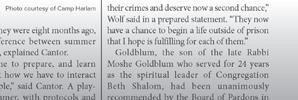

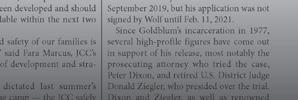

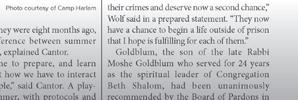
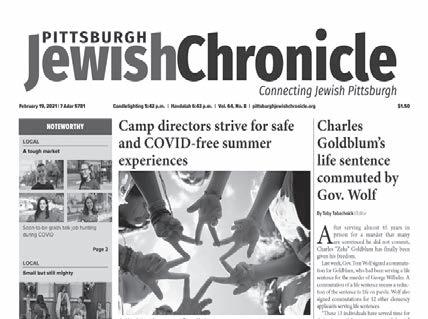
8 MAY 5, 2023 PITTSBURGH JEWISH CHRONICLE PITTSBURGHJEWISHCHRONICLE.ORG Headlines
The U.S. Capitol building. Photo by Martin Falbisoner via Wikimedia Commons
“If we believe seriously in peace and a two state solution, then we must evaluate whether any given legislative action gets us closer to those goals. This resolution did not.”
STORIES COME TO life HERE. Connect with Pittsburgh Jewish Chronicle. In your mailbox or all the time online at pittsburghjewishchronicle.org 5915 Beacon Street, 5th Floor, Pittsburgh, PA 15217
−SUMMER LEE
Robert Kraft and Meek Mill walk March of Living together
An unusual duo made the two-mile-plus walk from Auschwitz to Birkenau last week during the annual March of the Living in Poland: Robert Kraft, Jewish billionaire New England Patriots owner and philanthropist who launched a campaign last month opposing antisemitism, and Meek Mill, a prominent rapper from Philadelphia, JNS.org reported.
“It’s important for me to learn humanity’s history,” Mill said. “It’s also important for me to support Robert, all my Jewish friends, everyone that always supported me.”
Mill credited Kraft with teaching him about his Jewish culture and background, as well as supporting him “at a very high level” when he was jailed on gun and drug charges at age 19.
“He’s a man who’s very caring, and it’s very important to him to build bridges between people of the Jewish faith and people of color in America,” said Kraft about Mill.
“I always stand on anything that condemns racism,” Mill told CNN. “Now that I had an education, I’ll definitely spread the word to people in my culture about what I’ve seen and what I felt at that concentration camp.”
Yeshiva U restores women’s Talmud classes whose cancellation incited an uproar
Beginner and intermediate Talmud courses are back on the course schedule for
undergraduate students at Yeshiva University’s Stern College for Women, after an uproar over their cancellation, JTA.org reported.
Stern College administrators had said the school would not offer beginning and intermediate Talmud — courses about a foundational Jewish text for women at the country’s flagship Modern Orthodox university — because of low enrollment in those classes. That prompted more than 1,400 students, graduates and others to sign a petition urging the school to reinstate the classes and to endow a full-time chair of Talmud studies.
Now, Stern College says it is adding several Talmud classes to next semester’s schedule, citing increased interest among students.
“It was heartwarming to see the outpouring of interest revolving around women’s Talmud learning on the Beren campus,” Shoshana Schechter, Stern’s associate dean of Torah and spiritual life, and Deena Rabinovich, chair of the Jewish studies department, said in a letter distributed to students by email and WhatsApp.
Frankfurt can’t cancel Roger Waters concert over his antisemitism record, court rules
Frankfurt’s administrative court ruled that the city can’t cancel a Roger Waters concert after calling him “one of the most widely known antisemites in the world,” JTA.org reported.
Waters, the former frontman of the band Pink Floyd, took legal action and prevailed on April 25 after Frankfurt officials said in February they would cancel his concert in May. The city can appeal the ruling.
Today in Israeli History
Items are provided by the Center for Israel Education (israeled.org), where you can find more details.
May 5, 1959 — Museum marks first o cial Yom HaShoah
Kibbutz Lohamei
The Frankfurt court ruled that because Rogers “did not glorify or relativise the crimes of the Nazis or identify with Nazi racist ideology” in past concerts, it was not appropriate to cancel the upcoming one.
Waters’ full-throated anti-Israel activism has frequently been accused of veering into antisemitism. In addition to being a leader of the boycott, divestment and sanctions movement, Waters’ has flown a pig-shaped balloon bearing a Star of David at his concerts, spoken about the alleged power of a nefarious Jewish lobby in the United States and compared Israeli actions in the West Bank to South Africa under apartheid and Nazi Germany.
Barcelona shul vandalized a second time in as many weeks
Vandals defaced a Jewish house of worship in Barcelona on April 26, in the second such incident in the city in less than 10 days, JNS.org reported.
Graffiti reading “Why do you kill in Palestine” was spray-painted outside a Chabad synagogue in the city.
The Federation of Jewish Communities of Spain condemned the act, saying in a statement that “attacking places of worship of Jewish men and women in Barcelona is a clear demonstration of antisemitism.”
The incident came nine days after the Great Synagogue of Barcelona was defaced with graffiti reading, “Free Palestine from the river to the sea.”
Rabbi Pinchas Goldschmidt, the president of the Conference of European Rabbis, blamed
that desecration on Barcelona Mayor Ada Colau’s decision to sever the city’s twinning agreement with Tel Aviv.
Germany to fine Twitter for ignoring antisemitic content
Germany’s Federal Justice Office began in April the process of fining Twitter, under the country’s Network Enforcement Act, for failing to remove hate speech, JNS.org reported.
The German law requires social media sites to remove illegal content within seven days and, for the most egregious material, within 24 hours. The German office stated publicly that hateful material was published on Twitter, “which the authority considers illegal and, despite user complaints, was not deleted or blocked by the provider within the legally stipulated periods.”


Reportedly, Twitter faces a fine as high as nearly $55 million in Germany. An email to a Twitter press account auto-replied with an excrement emoji, as Twitter owner Elon Musk has tweeted it would, and it wasn’t immediately clear how to otherwise reach a spokesperson.
In January, a German activist group sued Twitter for hosting content denying the Holocaust, which is a crime in Germany.
One of Musk’s first publicized decisions after buying the company was to decrease the content moderation division. Many saw that as welcoming hateful speech, while others had long believed that division was driven by partisan politics. PJC
By
HaGetaot (the Ghetto Fighters) in the western Galilee welcomes 2,500 people to commemorate the first official Yom HaShoah (Holocaust Remembrance Day) under a law passed four weeks earlier.
May 6, 1986 — Israel helps U.S. with ‘Star Wars’ Israel and the United States sign an agreement for Israel to participate in research for the U.S. Strategic Defense Initiative, known as “Star Wars.” The effort leads to the Arrow and Iron Dome anti-missile systems.
May 7, 1953 — Histadrut admits Arabs
The Histadrut, the trade union that was launched in 1920 to protect Jewish workers from cheap Arab labor in Palestine and that covers 75% of Israelis by 1953, opens its membership to the state’s 185,000 Arab citizens.
that the United Nations needed to recognize the ineffectiveness of the British administration of Palestine.

May 8, 1947 — Zionist American rabbi addresses U.N. Rabbi Abba Hillel Silver, who in 1943 founded the American Zionist Emergency Council, testifies to the U.N. Special Committee on Palestine as part of a Jewish Agency delegation led by David Ben-Gurion.
May 9, 1979 — Post-Shah Iran executes Jewish leader Habib Elghanian, a Tehran businessman and leader of Iran’s Jewish community, is executed by the revolutionary Islamic government after his conviction of being a Zionist spy and “corrupter on Earth.”
May 10, 1994 — Arafat calls for jihad to free Jerusalem
In a secretly recorded, closed-door address at a mosque in Johannesburg, Yasser Arafat declares that the Oslo Accords, signed eight months earlier, are just a step toward Islam’s conquest of Jerusalem.
May 11, 1965 — Israel Museum opens
The Israel Museum, the state’s largest, opens in Jerusalem with more than 500,000 items. The museum was built with support from foreign benefactors, including the U.S. government, and through Teddy Kollek’s drive. PJC

PITTSBURGHJEWISHCHRONICLE.ORG PITTSBURGH JEWISH CHRONICLE MAY 5, 2023 9
— WORLD —
—
Headlines
— WORLD
We Prepare Trays for All Occasions HOMEMADE SALADS & SOUPS CATERING SPECIALISTS DELI PARTY TRAYS DELICIOUS FRIED CHICKEN UNDER THE SUPERVISION OF VAAD OF PITTSBURGH WE RESERVE THE RIGHT TO LIMIT QUANTITIES. KITOV MICROWAVE POPCORN $4.99 EA HELLMANN’S MAYONNAISE $3.89 25 OZ TELMA SOUP CUBES $1.09 3 X ½ OZ CHEESE GUY MILD CHEDDAR $5.99 6.4 OZ EMPIRE TURKEY PASTRAMI $10.79 LB A & H SALAMI $10.19 LB SHOR HABOR 2 LB SALAMI $16.99 EA HUMMUS $8.09 LB MEAT WINE SPECIALS HOURS WEINSTOCK RED BY W $9.99 750 ML BINYAMINA RESERVE WINES $24.99 750 ML SWISS STEAK $11 29 LB GROUND BEEF $6 19 LB MEALMART CHICKEN NUGGETS $21 99 4 LB GROCERY DELI COOKED FOODS MUSHROOM BARLEY SOUP $10.99 QT ORIENTAL CHICKEN SALAD $8.59 LB ORZO SALAD $5.29 LB ENCHILADA SALAD $9.99 LB STORE HOURS Sun. • 8 a.m. - 6 p.m. Mon.-Wed.• 8 a.m. - 6 p.m. Thurs. • 8 a.m. - 8 p.m. Fri. • 8 a.m. - 3 p.m. MONDAY & TUESDAY DINNER SPECIAL Hot Dog Paprikash Farfel $16.99 Serves 2
Rabbi Abba Hillel Silver argued
The Ghetto Fighters’ House at Kibbutz Lohamei HaGetaot is the world’s first Holocaust museum.
Dr. Avishai Teicher, PikiWiki Israel
— Compiled by Andy Gotlieb
Headlines
Peduto:
Continued from page 1
with Mitch Weiss, then-chief of staff to Boston Mayor Thomas Menino at the time of the Boston Marathon bombing, how essential it was to have a constant flow of information to quell rumors.
That goal was frustrated as the public safety director’s phone became waterlogged and unusable in the rain soaking the city that morning.
As Hissrich waited for a new phone, family members began to arrive, “awaiting the worst news that they’ll ever hear in their lifetime and looking at you for help,” Peduto recalled.
The former mayor said he had been friends with some of those people for decades.
“I looked around and thought, ‘Who can I ask for help?’ before realizing it’s just me,” he said.
A specific area was designated for the elected officials arriving — Gov. Tom Wolf, U.S. Sen. Bob Casey, Speaker of the Pennsylvania House Mike Turzai, U.S. Reps. Mike Doyle and Keith Rothfus, and Allegheny County Chief Executive Rich Fitzgerald. One of their goals, Peduto said, was to ensure the Jewish community had “anything and everything they needed.”
As the situation inside the building reached a conclusion and the shooter was arrested and taken for medical assistance, Peduto began assessing the magnitude of the situation and delivering accurate information to families as quickly as possible.
He had two partners in that endeavor, he said: the FBI and the Jewish Federation of Greater Pittsburgh.
“Before the FBI even put word out about a center where victims’ families could go for
Trial:
Continued from page 1
After five days, no jurors had been seated in the case.
But that’s by design.
The plan is to assemble a large enough pool of eligible jurors before lawyers on both sides start using their strikes — each gets 20 — to arrive at 12 jurors and six alternates.
More than two dozen were eligible as of Friday. Others had been eliminated for cause as the parties moved to strike them, mostly because of their stance on the death penalty one way or the other.
Jurors had filled out questionnaires a few weeks earlier in which they ranked their opinion on capital punishment on a scale of 1 to 10, with one being strongly against.
All last week and this week — and likely for several more weeks to come — jurors are brought before U.S. District Judge Robert Colville and seated face to face with him in his eighth-floor courtroom. A phalanx of government lawyers and defense attorneys sit on either side of the judge. The defendant is there, too, taking notes on a legal pad as two U.S. marshals keep an eye on him.
This could be an intimidating setup for the uninitiated, but Colville seems able to put jurors at ease with a congenial approach designed to elicit their true feelings about their ability to impose a death sentence when the time comes to sign a verdict slip.
information, they [Federation] had already created a center at the JCC where families were meeting and where counselors were already there to help with the trauma that everyone in that room was facing,” Peduto said.
The Jewish Community Center of Greater Pittsburgh was the first place he went after leaving the Tree of Life building.
His voice breaking with emotion, Peduto said it was there that, for the first time, he looked into the faces of friends whose lives were changed forever.
“It was Meryl Ainsman [then board chair of the Federation] who came up to me and hugged me,” he recalled. “There was that person I was looking for when I was outside and thought there was no one to help. That was the first time that morning that somebody helped me.”
Next, Peduto sat at a table with a friend who was trying to reach his mother.
“He pointed to his cellphone and said, ‘She’s not answering,’ later to find out that she was one of the victims,” Peduto said.
After visiting Chatham University, where the FBI had set up a base, Peduto went to the UPMC Mercy Trauma Center to see if there was anything he could do to help the wounded or their families.
On the drive to the hospital, he heard NPR report that the shooting was the most horrific act of antisemitism in American history.
“When I heard that, it was like I wasn’t there,” Peduto said. “It seemed like all of a sudden … Memphis and MLK and Dallas and JFK and now Pittsburgh and the Tree of Life. I had never thought of Pittsburgh like that. It was the opposite. And now, the fact that it would forever be linked in American history hit extremely hard.”
After Mercy, Peduto went to UPMC Presbyterian, where some of the gunshot
“There are no right or wrong answers,” he tells each one.
As part of the questionnaire process, prospective jurors were asked if they would vote for death automatically based on the facts of the crime or if they could impose a penalty less than death.
Colville and the lawyers then drill down to see if those jurors could truly listen to both sides before making a decision. In lawyerspeak, the prosecution team will present what they call aggravating factors favoring death. The defense team will present mitigating factors favoring life in prison.
Colville wants to make sure no juror is selected who has already made up his or her mind.
Some prospective jurors, often citing religious beliefs, have said they support an “eye for an eye” approach to justice while others said they don’t support capital punishment.
Last Friday’s court session was typical of how this process has played out — and why it takes so long to seat a jury in a case like this.
One African American woman who leads Bible studies in prisons cited the “thou shalt not kill” commandment she learned in church.
“I don’t think I believe in the death penalty,” she said.
One of the prosecutors, Soo Song, asked her what might change her mind. She said she didn’t know — “something heinous”
victims were being treated, then went home to shower before visiting some of the victims’ families, including the Rosenthals. Brothers Cecil and David Rosenthal were both killed in the massacre.
“I sat with the family that evening,” Peduto said. “It was evident that they were all in shock. There was a rawness of emotion that was almost covered over by what felt like a malaise of not knowing what to do or if this was actually real.”
That evening, he attended an interfaith service at Sixth Presbyterian Church, then a vigil at the corner of Forbes and Murray avenues.
“There have been very few moments in my life where I felt so much pride of being a Pittsburgher than when I walked out of that church on Forbes and Murray and saw thousands of people,” he said. “I was inside for the service and was impressed that a group of high schoolers could not only fill up that church but build it up to the point where the doorways were completely full. I had no idea I would walk outside and see 10 times that amount. That was something we needed to take us from panic and fear to start the transition toward sorrow and healing.”
Since the massacre, Peduto has worked with a professor from Connecticut and mayors from Orlando and Parkland, Florida, and Dayton, Ohio — all cities that experienced mass shootings — to create a checklist of action items for the first 24 hours after a mass shooting. It’s his way to help change the narrative of what Pittsburgh experienced, he said, and has helped him to heal.
“We’ve worked with the U.S. Conference of Mayors to make sure that [the checklist] is available in every city,” he said. “And I’m still working with the Strong Cities Network to expand that type of training for every
maybe. She said executing someone doesn’t help those left hurting but also said that “there may be something that could change my mind.”
After the juror left, prosecutors moved to strike her because they said she wouldn’t consider a death sentence.
Another prospective juror said he didn’t believe in the death penalty and would have to see “overwhelming evidence” to vote for it — and even then doubted he could impose death.
Prosecutors moved to strike him, too. Defense attorney Matthew Rubenstein, who has been doing most of the questioning for the defendant’s team, objected.
Colville listened to both sides, as he has done every day, but didn’t make any rulings. He has been saving that for the next day.
Another prospective juror said he favored capital punishment — he was an 8 out of 10 on that — and noted on his questionnaire that he had previously had an interest in America First and other far-right organizations. He also expressed the opinion that hate crimes are often “hoaxes blamed on white people.” Under questioning, he used the example of someone spray-painting an incorrect swastika on a building in an effort to make it appear that a hate crime had been committed for “monetary gain” or “media attention.”
In addition, he said he’d posted on an online forum where others had made jokes
mayor and one critical person on their staff throughout the country, and working to create a center for a new institute in Pittsburgh — more news about that later.”
The former mayor — he’s now a distinguished executive in residence at Carnegie Mellon University’s Heinz College of Information Systems and Public Policy, a consultant to R-MOR Cyber security and a principle at Sabean Innovation, Inc. — said he leaned on his Catholic faith in the moments and days after the massacre. That helped, he said, when he had no choice but to serve as a leader for Pittsburgh in its time of need.
As for the trial, which began with jury selection last week, Peduto said his priorities are the same as they were in the minutes and days after the attack: First, the families of the victims and the survivors; next, the Jewish community; then, the Pittsburgh region.
“When I think about the trial, I think more about a young girl who is starting high school, and all of a sudden this horrible event happened and it reminds her of the stories her grandmother told her, and where is she now?” Peduto said. “Will it bring up recurring trauma?
“The victims of Tree of Life — we’ll never know the true number. We’ve been affected to the core as a city. We have to be cognizant of how people will react when information starts coming out from the trial, information many people have never heard.” PJC
David Rullo can be reached at drullo@ pittsburghjewishchronicle.org.
This story is part of ongoing coverage of the Pittsburgh synagogue shooting trial by the Pittsburgh Jewish Chronicle and the Pittsburgh Union Progress in a collaboration supported by funding from the Pittsburgh Media Partnership.
about the synagogue shooting.
Assistant U.S. Attorney Troy Rivetti asked him what he thought about Jewish people.
He said they have “high IQs” and are “somewhat insular.”
After he left, Rivetti moved to strike him for “obvious bias” against Jews, saying the man’s opinions about Jews are “tropes” of alt-right online forums.
Rubenstein objected, arguing that the man’s opinion doesn’t mean he endorses the far right and that the First Amendment “allows us to have offensive views.”
The judge listened and moved on.
And so it has gone every day since April 24.
The selection process is expected to last several weeks, possibly taking most of May. The trial could last into July.
Robert Bowers, 50, of Baldwin, is the fourth defendant in the history of the Western District of Pennsylvania to face the federal death penalty. None of the others was executed. One pleaded guilty, and two others were spared by juries. PJC
Torsten Ove writes for the Pittsburgh Union Progress, where this first appeared. He can be reached at jtorsteno@gmail. com. This story is part of ongoing coverage of the Pittsburgh synagogue shooting trial by the Pittsburgh Jewish Chronicle and the Pittsburgh Union Progress in a collaboration supported by funding from the Pittsburgh Media Partnership.
10 MAY 5, 2023 PITTSBURGH JEWISH CHRONICLE PITTSBURGHJEWISHCHRONICLE.ORG






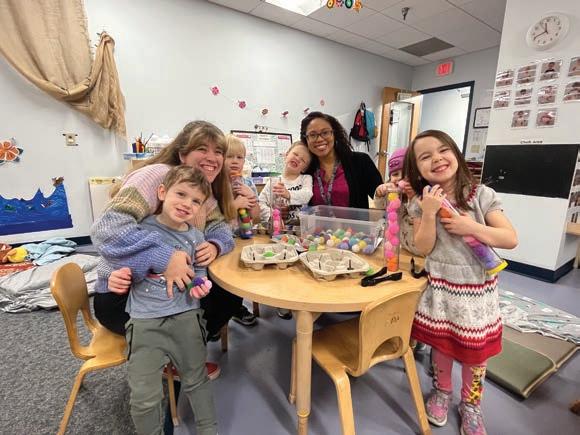


PITTSBURGHJEWISHCHRONICLE.ORG PITTSBURGH JEWISH CHRONICLE MAY 5, 2023 11 Come Join Our Community! IT’S ALL HERE JOIN TODAY! Squirrel Hill · South Hills Family Park in Monroeville
Israel’s current crisis is a necessary step in the process of state-making
Guest Columnist
Michael Oren
There’s no time that Israeli parents and grandparents hate more than late August. Summer programs have ended, school has yet to begin, and people still have to work. It’s then that the national cry goes up: “What are we to do with the kids?”
The answer for my family and so many others is simple: Water parks.
The nearest one is in Holon, a largely working-class, unobtrusive suburb of South Tel Aviv. There, under a ganglia of fountains, sprouts and geysers, careening down slides that can take an hour to climb and seconds to descend, scream thousands upon thousands of Israelis.
I watched them this past August, while keeping a wary eye on my grandchildren, and marveled. After nearly 50 years of living here, analyzing Israel and commenting on it, on the eve of our 75th birthday, I finally understood us. A mere eight-hour drive from Cairo and Damascus, children of different races, religions and ethnicities splash together in peace.
At least a fifth of all those frolicking in Holon’s waters were African. Not Jewish Ethiopians, but Sudanese, Somalians, Eritreans and others whose mothers and fathers perhaps immigrated illegally but whose children are Hebrew-speaking Israelis.
Another fifth were Arabs, the women wearing the same halal bathing suits identical to those favored by the Orthodox Jewish women chatting nearby, their children distinguished only by kippot and sidelocks. The remaining three-fifths were average, middleclass Jewish Israelis, mostly secular, all circling family picnic tables overflowing with food.
I looked at this glistening panorama, this festival of music, spray, schnitzel and glee, and thought to myself: This is the Israel that American Jews never see, that they cannot even begin to imagine. This, the Holon water park, is the real Israel.
Still, this idyllic image of Israel cannot disassemble the deep fissures that have opened within Israeli society in recent months, or the fact that Israel is in the throes of determining what sort of state our citizens wish it to be.
The Israel that exists today is very different from the one that I imagined growing up in a Conservative Jewish community in the 1960s. This was the Israel of kibbutzniks wearing their brim-down tembel hats and soiled khakis, improvising a hora after a hard day’s work in the fields. Of Ari Ben-Canaan, Leon Uris’s archetypical Israeli hero played by a godlike Paul Newman in the movie, “Exodus.” Of paratroopers praying at the Western Wall draped in tallitot of machine gun bullets. This Israel, the good guy, stood up to evil Arab dictators. Young, energetic, virile, brave and not too religious — that was the Israel of my mind.
Upon moving to Israel, though, I swiftly discovered reality. As a researcher for the Joint Distribution Committee, I visited neighborhoods so poor they couldn’t afford indoor plumbing and met Jews from underdeveloped countries who could scarcely write their own names.
In the army, while serving in a unit deliberately integrated with both well-off and socially disadvantaged soldiers, I saw an Israel grappling with worsening drug problems, crime and discrimination. I fought in morally nebulous wars and patrolled the streets of Hebron and Nablus under watchful, embittered, eyes.
At the same time, though, I saw the emergence of an Israel that outshone even my mind’s most scintillating image. I witnessed the arrival of nearly a million Jews from the former Soviet Union, the airlifting of tens of thousands of Ethiopian Jews, and the relocation of Western Jews in search of — improbably — high-tech jobs and lifestyles.
I saw, and in some cases participated in, the achievement of peace with Egypt, Jordan and the Abraham Accord countries. I watched as Israel built relations with China, India, Russia and dozens of Asian, African and South American nations, and the establishment of a deep and multi-faceted U.S.-Israel alliance. I saw Israel grow into a global leader in science, conservation and health care, a country with
an army more than twice as large as those of France and Great Britain combined.
Simultaneously, another Israel was forming in the minds of many American Jews. This was an Israel happy to receive financial and political support from Conservative and Reform Jews but unwilling to recognize their forms of worship. An Israel increasingly controlled by ultra-Orthodox parties which rejected conversions performed by many American rabbis, even Orthodox ones. An Israel of radical settlers who attacked Palestinian civilians, uprooted their trees and stole their land, and revered the late racist Rabbi Meir Kahane. Replacing the Israel of innovation, creativity and freedom, was an Israel of intolerance, closed-mindedness and occupation.
The impeccable Israel of the mind of the 1960s, and the far more tarnished image that later clouded it, both contained elements of reality. Israel was a jewel of courage and creativity as well as a dross of radicalism and intolerance. The truth lay in a combination of the two, a hybrid state that was at once incomparable and flawed. And for 75 years, this amalgam survived and even thrived, thanks in part to external enemies that forced it to cohere. But then came peace with several of those enemies, enabling Israelis to look inward and confront our dual identities.
The result has been tumultuous. Hundreds of thousands of Israelis have been demonstrating against their government’s attempts to remove all checks on its power by disempowering the Supreme Court. They are protesting the government’s support for ultra-Orthodox schools which, by refusing to provide their students with a modern education, are producing generations of Israelis who will be unable to sustain the state. The demonstrators are protesting bigoted ministers who, with their hatred, may trigger widespread violence with the Palestinians.
As someone who remembers the anti-war protests of the 1960s, when American flags were burnt and servicepeople spat upon, these demonstrations are, in contrast, outpourings of patriotism, festooned with Israeli flags and accompanied by choruses of “Hatikvah.” Policemen and soldiers are praised.
But what may seem to outsiders as a simple clash between pro- and anti-democratic forces in fact barely disguises far more fundamental fissures. There is rich vs. poor, cities vs. the periphery, Ashkenazim vs. Mizrachim, religious vs. secular, left and center vs. right, Arab vs. Jew.
This is Israel, a society that is struggling to define itself. The current crisis is, in fact, a necessary step in the process of Israeli statemaking. The fight over the government’s assault on the Supreme Court has succeeded in compelling many to face the contradictions in Israeli society. It has awakened liberal Israel from its long complacency on issues ranging from the failure of ultra-Orthodox schools to the absence of a diplomatic process with the Palestinians. It has focused attention on the urgent need for judicial reform while maintaining limits on the legislature. The success of our next 75 years hinges on our ability to address these issues and to bridge the schisms threatening to tear us apart.
At 75, Israel is still in the process of becoming. A state in which millions of people go to work or school each day, raise families and root for their favorite football teams. A nation that is healthy, high-functioning and beloved by so many of its citizens, where the radios play Passover music and their DJs speak in the language of our prophets. This, perhaps, is our greatest accomplishment: creating a truly independent state with all the headaches of sovereignty.
This is the Israel of the Holon water park, a site that American Jews should visit, preferably in August. This is the real Israel — complex, controversial and miraculous — a country with real challenges with which we, after two millennia of statelessness, are privileged to wrestle. PJC
Michael Oren has served as Israel’s ambassador to the United States, a Knesset member and deputy minister in the prime minister’s office. He is author of “2048 – The Rejuvenated States.” This story originally appeared in the Forward. To get the Forward’s free email newsletters delivered to your inbox, go to forward.com/newsletter-signup.

Harvard Hillel president’s campus fears: Lessons from my senior thesis
Guest Columnist
Sabrina Goldfischer
When I served as president of Harvard Hillel, the center for Jewish life on campus, in the 2021 academic year, I knew that the position required me to navigate extremely difficult conversations related to the Israeli-Palestinian conflict. As a Jewish student, I watched from a distance as my predecessors leaped into crisis management mode each time tensions

flared in the Middle East, and consequently on Harvard’s campus. In the spring of 2021, violence between Israelis and Palestinians erupted. I felt the emotional weight of Jewish students on campus; my phone constantly pinged with students seeking comfort. I worked around the clock to make sure they did not feel alone. I began to understand the challenges some Harvard students faced simply because they were Jewish.
These experiences spurred me to dedicate a year of my life to writing a senior thesis on what it is like to be Jewish on a college campus. I interviewed 60 Jewish Harvard students, Harvard Hillel staff members, and students and Hillel staff members at
nearby Massachusetts schools to help answer this question.
What I learned was concerning: The most acute examples of discrimination involved Harvard’s Israeli students. One student faced backlash for his involvement with Israel Trek, an Israeli student-led trip to Israel for Harvard students who do not identify as Jewish. He reached out to organizers of the anti-Trek movement on campus, hoping to begin a dialogue and potentially incorporate their feedback. They refused to speak to him. The Harvard Crimson published an article about the outreach effort, and quoted a member of the Palestinian Solidarity Committee, Harvard’s primary pro-Palestinian advocacy
group, who suggested that if they were to meet with the Israeli student, their physical safety might be jeopardized. He was shocked that The Harvard Crimson was willing to publish what felt like a personal attack.
Indeed, social alienation is unavoidable for Harvard’s Israeli students. Students recall moments of feeling like their “humanity was questioned.” One student said to their Israeli peer, “I can only imagine the war crimes you have committed.” Another explained that his friend was not allowed into a social organization when the leadership discovered he was Israeli. At Harvard, students face obstacles
12 MAY 5, 2023 PITTSBURGH JEWISH CHRONICLE PITTSBURGHJEWISHCHRONICLE.ORG Opinion
Please see Goldfischer, page 13
Chronicle poll results: Israel at 75
Last week, the Chronicle asked its readers in an electronic poll the following question: “How do you feel about Israel on its 75th anniversary?” Of the 247 people who responded, 49% said, “Glad, but concerned about everything that’s going on there”; 29% said, “Happy and proud”; 21% said, “Very worried about where it’s going”; and 1% said they didn’t care or had another opinion. Comments were submitted by 59 people. A few follow.
I am proud of Israel’s accomplishments to date and of all the Israelis fighting to preserve its democracy, but very worried about the current government.
The future of Israel is in jeopardy as long as Netanyahu desperately holds on to power.
If its creation in 1948 was a long-overdue miracle, then Israel’s continued survival against and among even worse and more numerous forces of evil and hatred may constitute an even bigger miracle. That
Goldfischer:
Continued from page 12
— social and otherwise — simply because of their nationality.
Among all my interviewees, one of the most pervasive themes was self-censorship. In particular, students felt uncomfortable identifying as “pro-Israel,” irrespective of the term’s definition. Certain students who identify as progressive in the American political system felt they needed to conceal their Israel politics in order to access campus liberal spaces. One student revealed that they “chose to not engage because it is a topic where you can be seen as absurd for being pro-Israel, and [I] would rather maintain the reputation of being a ‘normal person’ on campus.” Anti-Zionism, then, has become the norm in most social and intellectual milieux on campus. This affects how Harvard’s largest Jewish institution is perceived. For instance, another student recalled a first-year orientation program that purported to show incoming students the “bad parts of Harvard.” The tour guide, suggesting it was a hostile environment for Palestinian students, stopped at Hillel.
Every year, the PSC participates in Israel
Apartheid Week, a national movement on college campuses during which students organize rallies, speaker events and displays. At Harvard, its centerpiece is the PSC’s “Wall of Resistance” (which was up March 25-31).
Intended to remind students of the security barrier in the West Bank, it highlights the oppression of Palestinians, alleges that Israel is an apartheid state and invokes a series of other progressive social justice movements, too. The wall demonstrates how anti-Zionism affects the broader Jewish community — the
How do you feel about Israel on its 75th anniversary?
The possibilities of peace or a two-state solution seem more remote than ever.
Shame, fury, for Israel’s political treatment of Palestinians and Arabs.
I am fearful for its continued existence.
My concerns are about the dramatic polarization between Jew and Jew. That has never been good for us in all of our history. We need to be able to disagree without demonizing one another. That’s the best way to be a family — and we are all family.
The Zionist revolution was one of the greatest events of the 20th century. Zionism is, to me, the most beautiful word in the English language. Fundamental problems are being addressed now. Of course, it’s concerning. But Israel is a miracle, a refuge, and it’s a great country.
the uncertainties and problems — real and potential ones — that face us. My life is a finite one; I hope that Israel exists for centuries to come.
Democracy in Israel is alive and well — just look at those protests! You don’t always “win” in a protest, but the mere existence of them tells me that things are going well.
the land of milk and honey has thrived against all odds can only be attributed to Jewish zechel and the indomitable influence of Hashem!
environment created by groups like the PSC makes Jewish students feel, at best, censored, and at worst, unsafe. One student shared their reaction with me: “Seeing the country that’s such a huge part of my religion and identity
Israel and I are the same age, and the roads ahead of us are rocky ones. I pray that we both find a way to navigate through
alongside other oppressed communities for centuries, and it is these same humanitarian values that compelled Jews to escape persecution and inspired them to build and preserve a safe and secure Israel.
falsely demonized, singled out and misrepresented in the center of campus makes me feel hated and unwelcome, and signals to me that there isn’t a place for me or my values on this campus. By misrepresenting Israel, the Wall shuts down any dialogue, discussion, progress or learning, especially for the majority of Harvard students who aren’t knowledgeable about Israel and everything that it is and stands for.”
The PSC’s characterization is reductive and inaccurate; as another student described, “Slogans like ‘Zionism is White Supremacy’ [written on the Wall] serve to erase the identities and experiences of the millions of Mizrahi Jews, myself included, whose ancestors never set foot in Europe, and for whom Israel provided a refuge after they were ethnically cleansed from their homes.”
The Holocaust imagery on one of the panels of the Wall is inexcusable. I think of my ancestors who perished in the Holocaust; it is devastating to see my generational trauma exploited. Moreover, the Wall fosters a spurious sense of intersectionality by invoking so many issues of justice. Jews have fought
I have spent countless hours speaking with students, compiling results, and just sitting with my own reflections. I mentioned earlier that students involved in pro-Palestinian advocacy have refused to engage in conversation — both directly, by declining invitations to talk, and indirectly, in the abrasive statements on their Wall that preclude discourse,
The need for gun safety training
Israel, you are both 3,000 years old and 75 years young. Your ongoing existence is miraculous and not to be taken for granted. You are the greatest story of an indigenous people returning to their ancestral homeland to reclaim their independence. May you continue to serve as a pillar of peace and hope in the region, and may you continue to be a source of pride to your nation.
PJC
Toby Tabachnick
Chronicle weekly poll question: Where do you primarily get your national news? Go to pittsburghjewishchronicle.org to respond. PJC
like “there is no Zionist state without racism.” But we must pursue dialogue wherever and whenever we can — students cannot be afraid to talk to each other. Both of our communities have deeply held connections to this land. The more we talk, the better we empathize: The PSC’s Wall hardly encourages this.
My thesis begins with this quote from the 20th-century theological and social justice activist Rabbi Abraham Joshua Heschel: “We are closer to God when we are asking questions than when we think we have the answers.” This time it feels right to end with it. PJC
Sabrina Goldfischer is a senior at Harvard studying government with a secondary in Jewish studies. Originally from Poughkeepsie, New York, she served as president of Harvard Hillel and works as the Harvard Hillel intern for combating antisemitism. This column first appeared on The Times of Israel.
— LETTERS —
I just read Dana Kellerman’s guest column in the Chronicle (“Now is the time for sensible gun laws,” April 28). While I agree with most of her recommendations to lessen gun violence, I believe that she overlooked a very important one: Gun education and safety certification.
Many people may not be aware that there is no requirement to pass any gun safety training in order to obtain a concealed carry permit from your local sheriff’s department.
I suggest that in order to purchase a firearm, everyone must pass a certified gun safety course and earn a certificate. Furthermore, I suggest that an additional course be passed to get a concealed carry permit.
The NRA and like groups can step up to provide these safety courses.
This all comes with a big caveat: Only law-abiding citizens will obey any new gun legislation. The question will always remain: How do we take guns away from the bad guys?
Charles E. Stone Wexford
We invite you to submit letters for publication. Letters must include name, address and daytime phone number; addresses and phone numbers will not be published. Letters may not exceed 500 words and may be edited for length and clarity; they cannot be returned. Mail, fax or email letters to:
Letters to the editor via email: letters@pittsburghjewishchronicle.org
Address & Fax: Pittsburgh Jewish Chronicle,5915 Beacon St., 5th Flr., Pgh, PA 15217. Fax 412-521-0154
Website address: pittsburghjewishchronicle.org
PITTSBURGHJEWISHCHRONICLE.ORG PITTSBURGH JEWISH CHRONICLE MAY 5, 2023 13
Opinion
49% Glad, but concerned about everything that’s going on there 29% Happy and proud
21% Very worried about where it’s going 1% Don’t care/ Have another opinion
Indeed, social alienation is unavoidable for Harvard’s Israeli students. Students recall moments of feeling like their “humanity was questioned.”
Life & Culture
California filmmaker brings Scandinavian Holocaust story to Pittsburgh
— FILM —
By Adam Reinherz | Sta Writer
ACalifornia filmmaker wants Pittsburghers to know more about a piece of Scandinavian history. Along with screening her documentary “Passage to Sweden” at Row House Cinema in Lawrenceville on May 7, Los Angelesbased Suzannah Warlick will participate in a question-and-answer session.
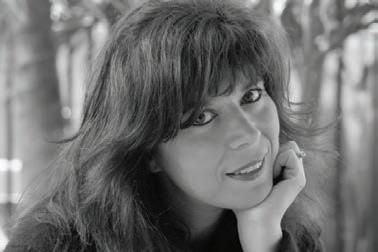
The program, which is sponsored by the Scandinavian Society of Western Pennsylvania, should shed light on a region and Holocaust narrative that gets little attention, Warlick told the Chronicle, speaking from her home in California.
“People know about the Holocaust in generalities,” she said, “but events that happened in Scandinavia and Budapest they’re not aware of.”
“Passage to Sweden” tells the story of Scandinavian upstanders who dramatically saved thousands of Jewish lives during World War II.
Approximately 7,500 Jews were living in Denmark when Germany occupied the country in early 1943, according to the U.S. Holocaust Memorial Museum. After initially helping Jews into hiding, Danish resistance workers transported almost 7,200 Jews and 700 of their non-Jewish relatives to neutral Sweden. By the end of the war, 120 Danish Jews died either in Theresienstadt or during the flight from Denmark, representing “one of the highest Jewish survival rates for any German-occupied European country.”
Recognizing this heroism is important, Warlick said.
These upstanders “risked their lives,” she continued. “They showed courage, they showed compassion to their Jewish citizens and they need to be remembered — and that legacy needs to be kept alive.”
Warlick spent 14 years making the film. There were periods of stop and start, she said, but the completed work represents her efforts to “make a difference.”
“In Judaism, and I’m sure in other religions, the saying is if you save one life you save the world, and it’s so true,” the Jewish filmmaker said. “This one life goes on to make future generations, and this one life goes on to impact other people by their experiences.”
Since its 2021 release, “Passage to Sweden” has screened at numerous Jewish film festivals and museums.

Bringing the documentary to a group like the Scandinavian Society of Western Pennsylvania is exciting, she said: “I don’t know if they necessarily know too much about the Holocaust, and even about their own history.”
But viewers aren’t the only ones learning.
“Making this film was the most educational experience of my life, to be quite honest,” Warlick said. “I’ve learned so much not only about the history, but about how important it is to bring these stories to light.”
She recalled trying to hire a young graphic artist to help with the project.
“She wasn’t Jewish. I really had to tell her all about the Holocaust. I couldn’t believe that she had no clue,” Warlick said.
A lack of Holocaust knowledge among young people isn’t surprising.
In 2020, the Conference on Jewish Material Claims Against Germany (Claims Conference), released a national survey on Holocaust knowledge among millennials and Gen Z. The state-by-state report found that 63% of respondents did not
know that 6 million Jews were murdered during the Holocaust. Additionally, within Pennsylvania, 45% of respondents couldn’t name a single concentration camp or ghetto; 10% believed Jews caused the Holocaust; and 52% had seen “Holocaust denial or distortion” online or through social media.
Warlick said she’s astonished by both the lack of knowledge and the rejection of facts.
“For any Holocaust deniers out there, how could you deny something that there’s so much truth about, so much visual proof, audio proof, individual truth about what happened,” Warlick said. “It’s amazing to me, how that can even be in the realm of the world.”
Countering that swell with a film is like using an oar to shift the sea, but Warlick is confident “Passage to Sweden” can help
change the tide.
“The more stories, the more education you put out there about the Holocaust about what happened, hopefully, hopefully, it will get out there to people who have other ideas,” she said.
Despite western Pennsylvania’s unpredictable weather, Warlick said she is eager to leave Los Angeles’s sunny comfort to further educational aims.
“I’m looking forward to meeting the Scandinavian audience in Pittsburgh,” she said. “I hope that this film is as educational to them as it was to me. And I hope that they learn something from it and take away something that they can pass on to others.” PJC
Adam Reinherz can be reached at areinherz@pittsburghjewishchronicle.org.
14 MAY 5, 2023 PITTSBURGH JEWISH CHRONICLE PITTSBURGHJEWISHCHRONICLE.ORG
Suzannah Warlick
Photo courtesy of Suzannah Warlick
Poster for “Passage to Sweden”
Photo courtesy of Suzannah Warlick
“In Judaism, and I’m sure in other religions, the saying is if you save one life you save the world, and it’s so true. This one life goes on to make future generations, and this one life goes on to impact other people by their experiences.”
−SUZANNAH WARLICK
www.pittsburghjewishchronicle.org
JEWISH FEDERATION ADULT LEARNING SUMMER CLASSES
LEARN WITH RABBI DANNY SCHIFF TWICE A WEEK

The Gifts of the Jews
JUNE 12–JULY 12
MONDAYS & WEDNESDAYS
9:30-10:30 AM
ZOOM: $140 FOR 10 SESSIONS
Examine the ten most significant gifts Jews have given to civilization and their impact on the world.
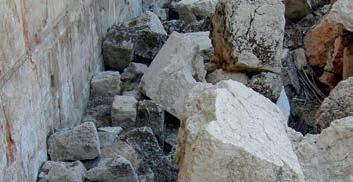
The Book of Lamentations: What Happens When the Jewish State Is Destroyed?
JUNE 13–27
TUESDAYS & THURSDAYS
9:30-10:30 AM
ZOOM: $70 FOR 5 SESSIONS
Explore the context of the Book of Lamentations and what the destruction of Jewish sovereignty teaches us.
QUESTIONS?
Contemporary Jewish Controversies
JULY 17–AUG. 2
MONDAYS & WEDNESDAYS
9:30-10:30 AM
ZOOM: $85 FOR 6 SESSIONS
Discuss with your peers controversies across the Jewish landscape, including Zoom prayer, intermarried rabbis and more.
cjohnson@jfedpgh.org or 412-681-8000
CONTINUING LEGAL EDUCATION 2023 SERIES

Underwritten by the Alan Papernick Educational Institute Endowment Fund

8:30-10:45 AM ON ZOOM
THURSDAY, MAY 4
RANSOMING CAPTIVES: A VEXING LEGAL DILEMMA


THURSDAY, JUNE 29
PLAGIARISM IN THE INTERNET AGE
SPECIAL EDITION! 8:30-10:45 AM ON ZOOM
FRIDAY, MAY 19
ISRAEL’S JUDICIAL CONFRONTATION: THE LEGAL PERSPECTIVE

REGISTER TODAY: jewishpgh.org/explore/federation-learning
OR SCAN QR CODE ->

Full inclusion is a core value of Jewish Pittsburgh. The Jewish Federation welcomes people of all backgrounds, races, religious affiliations, sexual orientations and gender expressions. The cost of taking a course is never a barrier to participation. If price is an issue, or if you need accommodation for a disability, please contact Cheryl Johnson at cjohnson@jfedpgh.org or 412-681-8000 so that we can make the course accessible for you.
Generously supported by the Elaine Belle Krasik Fund for Adult Education
PITTSBURGHJEWISHCHRONICLE.ORG PITTSBURGH JEWISH CHRONICLE MAY 5, 2023 15
Life & Culture
Free Festival of Books primed to grow, Jewish founder says
— BOOKS —
By Adam Reinherz | Sta Writer

Afree local literary event is being promoted by a person of the book.
Shadyside resident and Greater Pittsburgh Festival of Books founder and Chairman Marshall Cohen hopes to welcome more than 2,000 readers to the May 13 event.
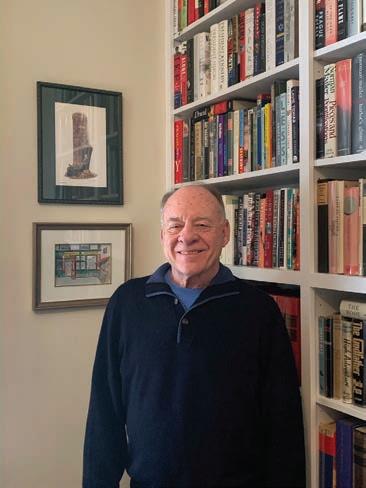
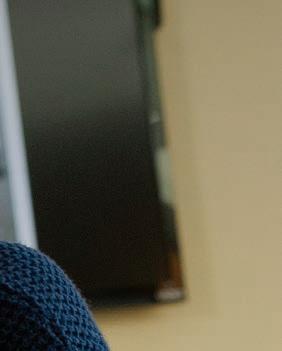
The festival is a one-day chance to hear from nearly 50 local and national authors and poets.
“The point that is important to me,” Cohen said, “is that it’s all free.”
Registration is encouraged but not necessary, he added.
As opposed to last year’s introductory event, which occurred at multiple sites throughout East Liberty and attracted 2,000 registrants, the festival’s second go-round is housed completely within the Pittsburgh Theological Seminary.
Given its proximity to bus lines and ample nearby parking, the location is ideal, Cohen said: “We’re bringing it to the community.”
Cohen wants to see as many attendees as possible but knows the Saturday scheduling is problematic for some community members, particularly those who are Sabbath-observant.
“It is something long term that we need to
figure out and address,” Cohen said.
Given the festival’s relative infancy, Cohen believes the Shabbat situation is resolvable.
“What you see with some book festivals is that they start small and they grow,” he said.
Cohen pointed to the Boston Book Festival.
“It started out one day in Copley Square in Boston and now runs almost a week,” he said. “They do some things during the week. They do some things during the year. So

HOW WE
Equipped with only pencils and rubber bands, eighth graders compete to design and construct the strongest catapult. By following supply and time constraints, students embrace efficiency and creativity in the engineering process.
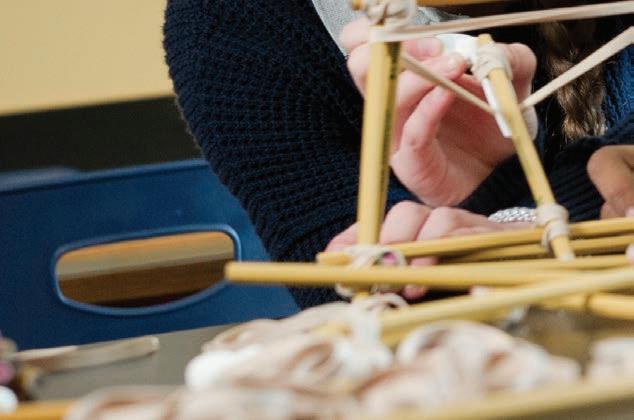
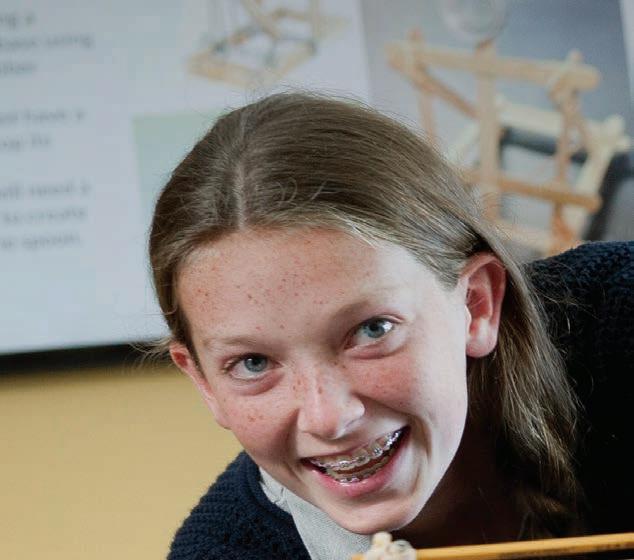
How will you give your child the tools to engineer success?

there’s all kinds of possibilities like that.”
Cohen believes the festival is headed toward growth and credited support from local libraries, organizations and independently-owned bookstores, as well as a talented cadre of writers appearing this year.
Of particular note, he said, are Emily Tamkin and Joseph Sassoon.

The latter is the author of “The Sassoons: The Great Global Merchants and the Making of an Empire,” a 2022 book about a Jewish Baghdadi family. Published by Penguin Random House, the book was described as “engaging ... compelling ... well-paced and supremely satisfying” by The New York Times.
Tamkin, a Washington D.C.-based journalist who served as a foreign affairs staff writer at Foreign Policy and BuzzFeed News, is the author of “Bad Jews: A History of American Jewish Politics and Identities.”
“Heartfelt, nuanced, and empathetic, this revelatory ethnography is a must-read,” according to Publisher’s Weekly. “Journalist Tamkin illuminates in this vibrant study the multifaceted nature of the Jewish experience in America.”
Cohen is particularly excited for Pittsburghers to hear from Tamkin, he said, adding that he identifies with much of what she described in her “fascinating story.”
“‘Bad Jews’ is a very timely book, in my own view of things that are going on in this
country,” he said.
“One of the fun — and honestly quite moving — things about publishing this particular book has been seeing the different ways it’s resonated with or spoken to different people in different parts of the country,” Tamkin told the Chronicle. “I am both excited and humbled to get the chance to speak with Pittsburgh readers.”
Cohen said he’s delighted the community can hear from Tamkin and a slew of other talents, including New York Times bestselling authors Jeannette Walls (“The Glass Castle”), Rinker Buck (“The Oregon Trail: A New American Journey”) and W. Bruce Cameron (“A Dog’s Purpose”).
“For those who can, we hope they take a look at the program, the website (pittsburghbookfestival.org) and hopefully come, participate and be part of it,” Cohen said. Whether it’s listening to talented writers and performers, picking up new books, getting copies signed or volunteering and helping the festival operate smoothly, there are numerous ways to be a part of this, Cohen said.
“I’m just blown away by what’s coming together here — the people, the communities. It’s been wonderful. It’s going to be great.” PJC
Adam Reinherz can be reached at areinherz@pittsburghjewishchronicle.org.
ENGINEER
BECAUSE “HOW” MATTERS
PK-12 • Four Campuses
16 MAY 5, 2023 PITTSBURGH JEWISH CHRONICLE PITTSBURGHJEWISHCHRONICLE.ORG
VISIT OPPORTUNITIES SHADYSIDEACADEMY.ORG/VISIT
Greater Pittsburgh Festival of Books founder and Chairman Marshall Cohen
Photo courtesy of Miranda Brazinski
Life & Culture
Old-fashioned coffee cake with nut crumble


— FOOD —
By Jessica Grann | Special to the Chronicle
Ihave a treasure trove of recipes handed down from my mom and her sisters — all excellent bakers. I remember this cake fondly as it was often served when special guests came to stay. It’s especially nice for brunch or on Shabbat morning with a hot cup of coffee or tea.
The cake is dense so it holds up to dunking, and the sweetness comes more from the nut crumble than the cake. The crumble mixture melts beautifully into the cake, so you have a spiced ribbon in the center as well as a sugary crust.
You can make this cake pareve with two small changes. You can also substitute pecans if you’re not a fan of walnuts.
I prefer this cake as my mother made it — with good-quality butter. I typically bake with unsalted butter, but since this recipe calls for no added salt, it’s fine to use salted butter if that’s what you have on hand.
Ingredients
For the cake batter:
3 cups all-purpose flour
3 teaspoons baking powder
1 cup sugar
1 cup (2 sticks) butter or margarine
3 large eggs
8 ounces sour cream or pareve alternative
For the nut mixture:
1 cup sugar
1½ teaspoons cinnamon
¼ teaspoon nutmeg
3 teaspoons vanilla extract
¼ cup softened butter or margarine
1 cup chopped walnuts or pecans
A pinch of salt (only if you used unsalted butter in the batter)
Set the oven to 300 F, and place the wire rack in the center.
Lightly butter or spray a Bundt or tube pan.
Sift together the flour and baking powder. Cream the butter and sugar for a few minutes on medium speed with an electric mixer.
Add the eggs one at a time until they appear to be mixed in, then add the flour mixture and the sour cream alternately. You can do this in three or four batches, just be sure that the flour is mixed in well before adding the sour cream; then make sure that the sour cream is well incorporated before adding more flour.
When nicely combined, turn the mixer off. Don’t overmix.
With a spatula, scrape the edges and bottom of the mixing bowl so there
are not any lumps of butter in the batter.
To make the nut mixture, mash the softened butter or margarine and sugar together with a fork or a pastry cutter in a small bowl.
Add the spices, salt and vanilla, and mix by hand until combined. Mix in the
chopped nuts last.
Take about ¼ of the nut mixture and sprinkle it across the bottom of the pan.
Using a large spoon, gently scoop half the cake batter into the pan, being careful not to drag or smooth it with the spoon as that would disrupt the even distribution of sugar.
www.pittsburghjewishchronicle.org
Let the batter rest for a minute or tap the pan gently on your countertop a few times to help the batter settle; alternatively, you can take a spatula and gently press the batter so it covers as much of the nut mixture as possible.
Sprinkle half of the remaining nut mixture over the batter, then repeat the same process with the second half of the batter.
Sprinkle the rest of the nut mixture on top and bake for 50 minutes or until a toothpick comes out clean. Metal and glass pans cook things differently, so it may take a full hour depending on the material of your pan.
Allow the cake to cool in the pan for 5-10 minutes.
Remove from pan while it’s still warm so that the sugary part of the cake releases well; if it cools down too much it may stick and crumble. Run a sharp knife around the edges, if needed.
Wearing oven mitts, place a large plate over the cake and flip it upside down and out onto the platter.
Let it cool completely before serving.
This cake keeps beautifully for several days and also freezes well. Enjoy and bless your hands! PJC
PITTSBURGHJEWISHCHRONICLE.ORG PITTSBURGH JEWISH CHRONICLE MAY 5, 2023 17
Jessica Grann is a home chef living in Pittsburgh.
Old-fashioned coffee cake with nut crumble
Photo by Jessica Grann
Old-fashioned coffee cake with nut crumble
Photo by Jessica Grann
The crumble mixture melts beautifully into the cake, so you have a spiced ribbon in the center as well as a sugary crust.
Bat Mitzvah
Ellie Berger will be called to the Torah as a bat mitzvah on Saturday, May 6, 2023, with Kesher Pittsburgh. She is the daughter of Stephanie and Bradley Berger and the sister of Henry Berger. Ellie is the loving granddaughter of Ellen and Neil Berger and Barbara and Larry Gerson. Ellie is the blessed great-granddaughter of Samuel Barfield. She is a sixth grader at Environmental Charter School. Ellie loves her two dogs, Cody and Tug, and her favorite activities include babysitting and jewelry making.
Bar Mitzvah
Max Gordon, son of Bonnie and Greg Gordon, will become a bar mitzvah on Saturday, May 6, at Beth El Congregation of the South Hills. Grandparents are Harvey and Dottie Goldstein of Pittsburgh, and Howard and Sandra Gordon of Virginia Beach, Virginia. PJC
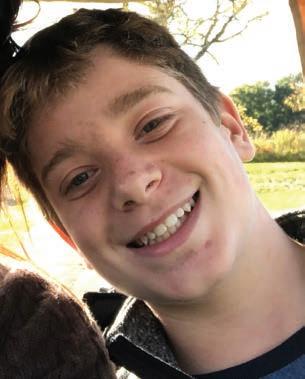




We are all from the same dough
just can’t do it. After many failed attempts to limit my carb intake, I cannot stop eating bread. It is simply too delicious. And too symbolic.
Recently, on the news program “CBS Mornings,” there was a segment about a new bakery and the universal love of bread. The story began by noting that bread is one of the oldest crafts of culinary history, there being evidence of baking it from nearly 14,000 years ago. It’s not surprising, given that bread in one shape or another is part of every culture on the planet. It is certainly part of our Jewish tradition, both ritually and culturally. Who among us hasn’t eaten one or more of the following: challah, bagels, matzah (yes it counts!), rugalach, rye, bagelah ... and so on.
Our tradition tells us that when it comes to the lechem ha-panim, the eating is secondary. The preparation and baking of the loaves are of primary importance. In the Mishnah we find that the dough for all the loaves was kneaded together, but the loaves were baked two by two.
Rabbi Samson Raphael Hirsch, a 19th-century German rabbi and philosopher used this teaching to draw lessons about communal unity and responsibility. He wrote: “Each challah — representing each tribe — in its foundational stage (of kneading) merited the same degree of individual attention; but they were solidified (baked) only two at a time. This one with that one and this one for the sake of that one.”
In Rabbi Hirsch’s interpretation, the images of loaves being baked in pairs evokes the strong sense of connection and responsibility that can exist between two people, two tribes or even two communities. The loaves were “shown” all week as daily reminder that each tribe, and ultimately each one of us, is an important part
Why all this talk about bread? Because bread appears in this week’s Torah portion, Emor. The reference occurs toward the end of the portion, after many verses regarding the regulations governing the lives and service of the priestly class. There we find a description of the lechem ha-panim, “the bread of display.”





The lechem ha-panim is an odd ritual. The priests were to take carefully measured flour, bake 12 loaves and place them in two rows on the table of the Tabernacle that traveled with the Israelites through the desert on Shabbat, along with some spices — and there they remained in place until the next Shabbat. After the week of display, the loaves were eaten by the priests. Why the wait? Why not eat the bread when it was hot, with that delicious fresh-baked smell and taste? Assuming that the priests didn’t necessarily enjoy eating days-old stale bread, there must be more to this ritual than exhibiting patience and self-control.
of the community.


Allow me to take the nearly exhausted bread analogy one step further: It is our job to remember that we all come from the same dough — kneaded with the same intentionality and care. Although separated into different loaves for baking, the paring of the challah breads reminds us that we are not alone — we are part of a mutually caring community.
As the Talmud states: “Kol yisrael arevim zeh bazeh,” meaning “All of Israel are responsible for each other.” (Shevuot 39a)










As we prepare to eat our challah this Shabbat, may we remember the message of the lechem ha-panim as we support and uphold each other. PJC
Rabbi Jessica Locketz is a rabbi at Rodef Shalom Congregation. This column is a service of the Greater Pittsburgh Jewish Clergy Association.





























18 MAY 5, 2023 PITTSBURGH JEWISH CHRONICLE PITTSBURGHJEWISHCHRONICLE.ORG Torah Celebrations CA$H BUYING DENNY OFFSTEIN AUTO SALES 7 DAYS 724 -2 87 -7771 DOMESTIC FOREIGN CARS TRUCKS SUVS VANS GOOD WRECKED MECHANICAL PROBLEMS LEGAL TITLE TRANSFER PURCHASED AT YOUR LOCATION BUYING – AUTOS Business & Professional Directory
WANTED: Grandma & Pap’s VERY Old Clothing, Costume Jewelry, Hats, Purses, Shoes, Fur Coats/Stoles, Wedding Gowns, Quilts/Textiles. Quantity preferred. Cash Paid - Will Pick Up Toll Free 888-736-7242 BUYING RUMMAGE SALE Friday, May 5th and Sunday, May 7th 9am–2pm Congregation B’Nai Abraham 519 N. Main Street Butler, PA 16001
Parshat
Leviticus 21:1 – 24:23
Rabbi Jessica Locketz
Emor
Summer Classes at the Workshop June · July · August Go Reade S c d! • Testing • Language skills evaluation To enroll your child, call Dr. Shandel Gilbert: 412-421-1895 readersandwritersworkshop.com • Cognitive training in reading, writing, and analytical thinking • Tutoring: in person or online Antiques & Rummage Sale 5th Sunday, May 7th Congregation B’Nai 519 Main PA
Although separated into di erent loaves for baking, the paring of the challah breads reminds us that we are not alone — we are part of a mutually caring community.
Obituaries













HEYMAN: Judith Brauman Heyman, May 25, 1940 – April 13, 2023. Raised in Pittsburgh to second-generation Americans Freda and Milton Brauman, she grew up in a home filled with love. Jude is survived by her brother John (and wife Sharon and their daughter Kate), her son Will (and wife Pegan and their sons Grayson and Ry), her daughter Elizabeth (and husband Andy and their son Nate), cousins, nieces, nephews and numerous lifelong friends. She was predeceased by her beloved husband, Art “Heart” Heyman (1929-2013). Instant love and friendship held them together for a half century of adventures. She received undergraduate and master’s degrees from the University of Pittsburgh; a second master’s from George Washington University; National Endowment for the Humanities grants to study William Faulkner at Ole Miss and comparative Shakespeare and kabuki theater in Japan; and years of foreign language classes. A gifted and dedicated educator, she taught countless students in both public and private schools, with most of her career spent in the Montgomery County public high schools. Although a formidable presence in the classroom, her students often considered her their best and most influential teacher. A consummate planner, Jude organized family travel to global destinations across five continents. Jude had a startling intellect, an exceptional wit, an unquenchable curiosity, a generous spirit (except for fools), and a ready laugh. A steady, firm presence, she anchored her immediate family and served as surrogate parent and mentor for many others. Jude passionately enjoyed traveling, eating good food, entertaining, reading and the arts. She would like to extend her heartfelt thanks to the entire British royal family for decades of entertainment. In lieu of flowers, the family would appreciate donations to WETA, the National Parks Conservation Association or to a charity of your choice. Against her express wishes, we will celebrate her at the home of her daughter on May 6, 2023, from 2 to 4 p.m.
HIMMEL: Bernard J. “Bernie” Himmel of Lockport, Illinois, passed away peacefully at home on Wednesday, April 19, 2023. Born on April 11, 1940, in Canton, Ohio, and raised in Pittsburgh. Son of the late Samuel and Viola (Koltin) Himmel. Survived by his loving wife of nearly 50 years, Maryann “Lonnie” Himmel; daughters Gina (Billy) Pauley Jr. of Brownstown, Michigan, and Beth (Craig) Witzig of Lockport, Illinois. Devoted grandfather of Brianna (Jack) Stockdale, Sophia Patrick, Rose Patrick, Colton Witzig and Addison Witzig. Brother of Lee (Marcia) Himmel of Pittsburgh. Uncle of Rochelle (James) Wagner, Brian (Amy) Himmel and Alan (Dana) Himmel, all of Pittsburgh. He was a devoted husband, father, grandfather, brother and dear friend to many. Contributions in Bernie’s memory may be made to the American Cancer Society. A service of Ralph Schugar Chapel, Inc.

JOHAN: Arlene (Hydovitz) Johan passed away on Thursday, April 27, 2023. She was 90 years old. Arlene was born on July 7, 1932, in Pittsburgh, where she resided her entire life. Arlene was married to the late Dr. Jerrold D. Hydovitz and also to the late Dr. Morton Johan. Arlene is survived by her son, Charles L. Hydovitz, her daughter, Carol A. Hydovitz, and niece Nancy Finkelstein (Alan). She was preceded in death by her parents, Joseph and Lena Hornstein, sister and brother-in-law, Shirley and Meyer Gerstein, and niece, Gail Gerstein. Arlene and Jerry were frequent patrons of the Pittsburgh Symphony, Pittsburgh Playhouse, opera and dance at the Benedum Center. They loved to travel. Their adventures took them to various destinations in the United States (especially Scottsdale, Arizona), Mexico, Canada, Europe, Israel and Africa. Arlene often volunteered at WQED for charitable events over the years. After raising her children, Arlene managed The Quarry, Inc., a cosmetics shop located in Squirrel Hill and Shadyside for over 20 years. Graveside service and interment were held at Beth Shalom Cemetery. Arrangements entrusted to Ralph Schugar Chapel, Inc., family owned and operated. schugar.com










MESKINA: Bella Meskina, on Monday, April 24, 2023. Beloved wife of the late Boris Meskin. Loving mother of Lyudmila Meskina (Michael Tseytlin) and Aleksander Meskin (Svetlana Meskina). Grandmother of Eugene Tseytlin (Faina Linkov), Anna Knight (Jared Knight) and Nikita Meskin (Aurora Meskina). Great-grandmother of Ilana, Ariella, Levi, Charlotte, Henry, and Celice. Bella was born Jan. 12, 1931, in Samara, Soviet Union. She worked as a neurologist. Services were held at Ralph Schugar Chapel, Inc. Interment Homewood Cemetery. Contributions may be made to the Jewish Federation of Greater Pittsburgh, 2000 Technology Dr, Pittsburgh, PA 15219. schugar.com
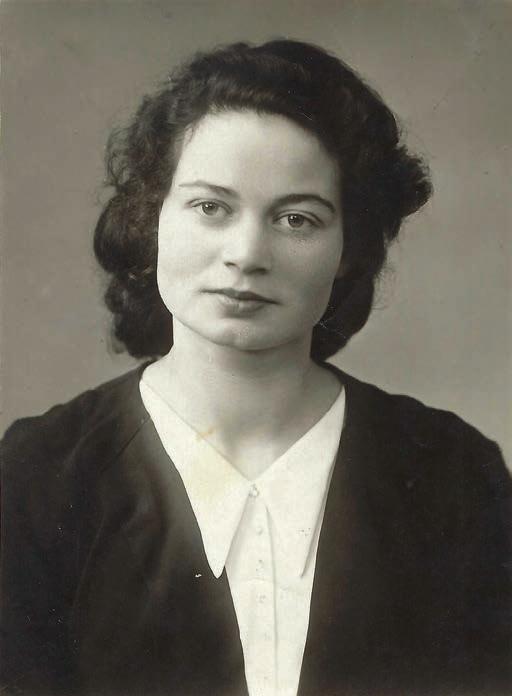
Please see Obituaries, page 20
Jewish Association on Aging gratefully acknowledges contributions from the following: A gift from ... In memory of...

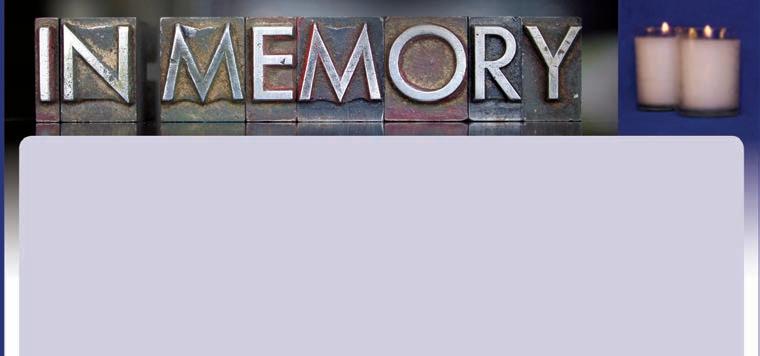
Marlene
Harry



Arthur & Gloria Pollock and Family
Linda & Je rey Reisner and Family
Marc Rice
Marc Rice
Ross
Schlesinger & Seed
Jerry & Ina Silver
Sharon Snider
Marsha Sadowsky Stern
Sunday May 7: Bernhardt Blumenfeld, Edward Harry Frankel, George Jaskol, Henry Kamin, Ida Lazier, Sophia Mallinger, Minnie Margolis, Samuel Novak, Israel Rosenberg, Jack E Ryave, Max Snider, Charles Ben Stewart, Max Unikel
Monday May 8: Allan Calman, Sonia Cohen, Abe Finegold, Dr Charles M Friedland, Sara Fay Sachs Goodman, Pearl Greenberg, Goldie Lerner, Gusta Dickler Linett, Goldie Love, Abe Picovsky, Sam Portnoy, Goldie Prashker, William B. Roth, Gertrude Routman, Rose M. Rudov, Fannie Ann Samuels, Sherman Howard Schenk, Julius Stahl, Samuel E Swartz
Tuesday May 9: Cora G Barnett, Harry Berenfield, Benjamin B Chotiner, Lois Ruth Cohen, Leonard Frank, Shane Rose Gelman, Herman Greenstein, Paul E Gusky, Allan L . Janowitz, P. Fred Kamens, Anna T Kirkell, Ruth Klein, Morris Krasik, Sol S Kurtz,Minnie Latterman, Abe Leventon, Paul Mainzer, Evelyn Meyer, Max Rice, Rebecca Wesoky Robins, Dorothy Rosenthal, Sherman Howard Schenk, Sophia Silverman, Rubin Solomon, Max Weiss, Frieda W Wol
Wednesday May 10: Hyman Louis Abrams, Rose Seiger Allen, David Busis, Harry Faberman, Anna K Farbstein, Anna Feivelson, Philip Grossman, Sanford C Kramer, William Samuel Landau, Beatrice (Bibe) Schlesinger, Mayme Skirboll, Charles Teper, Yetta H Wheeler
Thursday May 11: Alexander Bardin, Anna Bourd, Abraham Mitchell Caplan, Bernard Carlton, Jerome Gelman, Leah M Greenberg, Bessie N Harris, Betty York Joseph, Benjamin Kellman, Rose Levin, Joseph J Martin, Samuel Saul Morris, Sylvia Rosenberg, Phillip Ruben, Abraham Saville, Amelia K Silver
Friday May 12: Alice G . Eisner, Marion Feldman, Anna E. Ginsburg, Harry Goldberg, Hilda Goldberg, Bertha B Levy, Harold Liptz, Theodore Mervis, Ethel A Miller, Samuel Myer Roth
Saturday May 13: Lena Davidson, Irwin J Harris, William Kempler, Edna F Levine, Judith Gutkowska Mendelsohn, Saul M. Morris, Saul Schein, Ada M. Shepard, Abraham Shiner, Maurice A. Steinberg, Samuel Stoller, Rosalee Bachman Sunstein, Celia S Wedner
NOTICE OF HEARING
IN RE: PETITION OF TEMPLE HADAR ISRAEL, A PENNSYLVANIA NON-PROFIT CORPORATION TO APPROVE A FUNDAMENTAL CHANGE; Case No. 48-2023 in the Orphan’s Court Division of the Court of Common Pleas of Lawrence County, Pennsylvania. Notice is hereby given that the Court has set a hearing on the Petition of Temple Hadar Israel to approve a Fundamental Change in the form of the transfer of ownership and management of its cemeteries and the transfer of certain assets to the Jewish Cemetery and Burial Association of Greater Pittsburgh. e hearing will be held in the Orphans’ Court Division, Court of Common Pleas of Lawrence County, Pennsylvania, 430 Court Street, New Castle, Pennsylvania on June 9, 2023, at 1:30 p.m. in Courtroom No. 4 before the Honorable David H. Acker. Any interested person is invited to attend. Information may be obtained from Leo M. Stepanian II, Esq., Stepanian & Menchyk, LLP, 222 South Main Street, Butler, Pennsylvania 16001, phone (724)285-1717; Attorney for Petitioner.
www.pittsburghjewishchronicle.org
PITTSBURGH JEWISH CHRONICLE MAY 5, 2023 19
Contact the Development department at 412.586.3264 or development@jaapgh.org for more information. THIS WEEK’S YAHRZEITS — Anonymous Harry Berenfield Anonymous Leah Katz Anonymous Max Rice
Alpern Sylvan Alpern
Marlene
Alpern Sylvia Shaer
&
Morris B Pariser
Ronna Back
Rose Pinsker
Theodore Pinsker
Lena Davidson
Joanne Brodell
Alpern
Sylvia Gerson
Max
Rice
Rosen Isadore Rosen
Beatrice
W Schlesinger
Families
(Bibe)
Judith
Mendelsohn
Gutkowska
Max
Snider
Gerraldine &
Nathan Sadowsky
The Original Our Only Location At 2145 BRIGHTON ROAD • PITTSBURGH, PA 15212 • 412-321-2235 Serving the Jewish Community Since 1924
Obituaries
Obituaries:

Premiere showing in Pittsburgh area of this compelling and unique documentary.
Director
Continued from page 19
Viewings at & Pittsburgh, PA 15201
Suzannah
Warlick available for Q&A
Limited seats.Advance ticket purchase recommended
Tickets $12 Buy tickets at rowhousecinema.com
412-904-3225
For more information about the film: https://passagetosweden.com

This moving documentary, Passage to Sweden, examines the unique and mostly unknownexperience of Jews in Scandinavia and Budapest during WWII. Spontaneous and dramatic rescue operations were conducted to save thousands of lives. Passage to Sweden captures the courage, compassion, and protection that Scandinavian countries and their citizens offered to refugees facing persecution and is a reminder that anyone can make a difference.

Michael Berenbaumfrom the American Jewish University commented “No one who sees this film can fail to be impressed by these important humanitarian efforts that made such a profound difference in the lives of those rescued and rehabilitated. One seldom concludes a Holocaust-related film by feeling morally uplifted but this is a film that celebrates human decency and compassion.”
The showing of this documentary is sponsored by the Scandinavian Society of Western Pennsylvania http://pittsburghscandinavians.org/


OSTFIELD: Howard G. Ostfield, 82, of Pittsburgh, passed away peacefully on April 29, 2023, after spending time with family and great friends. Howard is survived by his sons Marc and Alan, daughter-in-law Jennifer, son-in-law Michael, grandson Benjamin, granddaughter Hannah, brother Paul, and nieces Sheryl and Dana. Howard was preceded in death by his parents, Mildred and Joseph, and his twin sister, Roselie. Howard was a loving father, husband, grandfather and friend to everyone. Howard was born March 8, 1941, attended Schenley High School and the University of Pittsburgh. Howard loved all sports, playing softball, football and golf as an adult, and was an avid supporter of his hometown Steelers, Penguins and Pirates. Howard was an active outdoorsman, spending countless hours, days and weeks hiking with great friends, including the entire Appalachian Trail. Howard’s favorite pastime was going “doggin” in various Pittsburgh parks with his loyal, best dog friends Coach, Woody, Cody and Rosie over the years. Howard was a chemist with Bayer for almost 30 years, a career that he enjoyed and that enabled him to retire early, travel throughout the country many times, go on safaris in Africa and enjoy all that he helped create. A special thank you to the people with Presbyterian Senior Care and the Willows for their loving care and support for Howard and his family during the later years of Howard’s life. Funeral services for Howard were held at Homewood Cemetery on Tuesday, May 2, 2023, followed by Howard being laid to rest at the Smithfield East End Cemetery. Memorial donations can be made to either Pittsburgh Youth Leadership (1034 Fifth Ave., Suite 400, Pittsburgh, PA 15219, (pittsburghyouthleadership.org) or Hebrew Free Loan Association of Pittsburgh (4905 Fifth Ave., Suite 211, Pittsburgh, PA 15213, hflapgh.org). PJC

20 MAY 5, 2023 PITTSBURGH JEWISH CHRONICLE PITTSBURGHJEWISHCHRONICLE.ORG
Put Your Graduate in the SPOTLIGHT! Make a memorable keepsake for years to come! Contact Phil Durler at 724.713.8874 or pdurler@pittsburghjewishchronicle.org to place an ad. Celebrating all graduates High School and College in our May 26 issue. Simply share with us a photo, personal message and the school name, or purchase a L’Chaim Listing for $18 that lists the student’s name, high school and college they plan to attend (if applicable) or graduated from. Ad space closes May 22nd. Congratulations Duquesne University RACHEL WEXLER Thomas Jefferson High School Text Here 1/8 page ad - $75 5”w x 3.25”h Mazel Tov University of Pittsburgh CHAD GOLDBERG Accounting Text Here 1/4 page ad - $100 5”w x 6.75”h
Real Estate

SHADYSIDE • $624,000 - OPEN SATURDAY 12-2
206 N. Woodland Road
Smith-Rosenthal Team
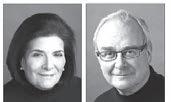

Jason A. Smith & Caryn Rosenthal
Jason: 412-969-2930 | Caryn: 412-389-1695
Jasonasmith@howardhanna.com

Carynrosenthal@howardhanna.com
h Contact me today to discuss all of your real estate needs! Sherri Mayer, Realtor Squirrel Hill Office C: 412-760-0412 O: 412-421-9121x225 sherrimayer@howardhanna.com HowardHanna.com With the increasing costs of long-term care, having the help of a legal professional when planning for your family’s future can help you make better decisions that can result in keeping more of your money. We help families understand the strategies, the bene ts, and risks involved with elder law, disability and estate planning. www.marks-law.com 412-421-8944 4231 Murray Avenue Pittsburgh, PA 15217



THE BEST OF THE IN YOUR EMAIL INBOX ONCE A WEEK. Sign up on the right hand side of our homepage. pittsburghjewishchronicle.org























”FinestinShadyside” 412-661-4456 www.kaminrealty.kamin.com SHOWCASE YOUR PROPERTIES EVERY WEEK IN THE PITTSBURGH JEWISH CHRONICLE


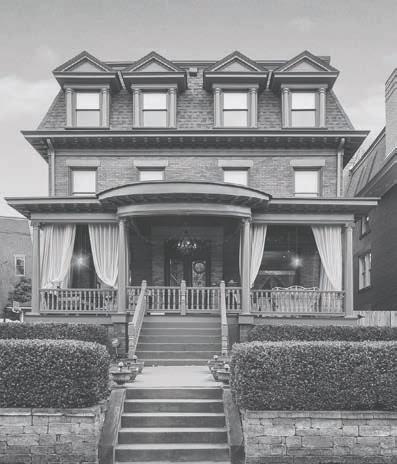
5125FifthAve. 2&3Bedrooms Cornerof FifthandWilkins Spacious 1500-2250squarefeet Contact Phil Durler to schedule your advertising pdurler@pittsburghjewishchronicle.org 724-713-8874 advertising@pittsburghjewishchronicle.org
North Woodland Road Townhome. Unique custom built sophisticated 4 levels. Lower Level has a great wine cellar, storage, int garage, and a side room which could be an office. First floor has a great room kitchen, dining and living area, plus 1/2 bath. This room leads to an unbelievable courtyard and luscious grounds with a sprinkler system. Next level- large room with a whimsical full bath. Top level has a great master area, with master bath and laundry, Smashing steel and glass staircase, dramatic lighting. Terrific acrhitectural details.
OAKLAND - $290,000
Dithridge House
New listing. 2 bedroom 2 bath on the 11th floor with a closed in balcony with a great view. Balcony can be used year round.Building has many amenities. Guest Room, Party Room, Meeting Room, Pool, Guest Suites, Meeting Room, Outdoor Guest Parking, Valet Parking etc.
LAWRENCEVILLE - $620,000 - MOTIVATED SELLERS - PENDING

721 53rd Street
A stunning Lawrenceville home o ers 4 levels of luxurious finishes and unparalleled city views. The dazzling hardwood floors and an open-concept layout make living and entertaining easy. The kitchen is a chef’s paradise with stainless steel appliances, Glacier White Quartz countertops, a large island with seating, and crisp white kitchen cabinets elevated with a pop of color from the handmade backsplash tiles and mosaic inlays. Three spacious bedrooms, 3.5 contemporary-styled baths, and thoughtful storage throughout. The top-floor bonus room features French doors to a private balcony with exceptional vistas of downtown and beyond. Enjoy the convenience of dedicated 2-car garage parking equipped with an EV charging outlet. Convenient to public transportation, the Universities, Hospitals, High-Tech corridors, restaurants and shopping. LERTA Tax Abatement.
helping you plan for what matters the most Michael H. Marks, Esq. michael@marks-law.com member, national academy of elder law attorneys



PITTSBURGHJEWISHCHRONICLE.ORG PITTSBURGH JEWISH CHRONICLE MAY 5, 2023 21 MELISSAREICH REALTOR®,GREEN,SRES 412-215-8056(M) 412-231-1000(O) RUBINOFFREALTY.COM REPRESENTINGPITTSBURGH’S MOSTCOVETEDADDRESSES RUBINOFFREALTY 6108HOWESTREET|SHADYSIDE|$1,499,000 STUNNING7BEDROOMHOME,BURSTINGWITHORNATEDETAILS 2CARGARAGE,SNOWMELTSYSTEM,LOVELYCOURTYARD NEWLISTING JILL and MARK PORTLAND RE/MAX REALTY BROKERS 412.521.1000 EXT. 200 412.496.5600 JILL | 412.480.3110 MARK FOR SALE
REALTOR SERVICES FOR SALE
Are You Buying or Selling a Home? Let Us Guide You Through the Process! CALL THE SMITH-ROSENTHAL TEAM TODAY.
5501 Baum Blvd. Pittsburgh PA 15232 Shadyside Office | 412-361-4000 FOR RENT www.pittsburghjewishchronicle.org
Netflix’s ‘Rough Diamonds’ brings viewers into the drama of Antwerp’s Orthodox diamond district
By Gabe Friedman | JTA
Anew drama on Netflix centered on a haredi Orthodox family that runs a business in Antwerp’s famed diamond district hit the platform last month and is drawing comparisons to the hit Israeli series “Shtisel.”

“Rough Diamonds,” a joint production from Israel’s Keshet International and Belgium’s De Mensen, follows the Wolfson family as it navigates internal tension and business struggles in the wake of a death in the family. The protagonist, who left the haredi world 15 years earlier, returns to Antwerp to look into his relative’s death and help steer the family company back to prominence.
Until the past decade, Antwerp was home to over 80% of the world’s annual uncut diamond trade, and much of it was dominated by haredi Orthodox Jews. The city was home to a large Jewish population for centuries after welcoming many Jews who left Spain and Portugal in the wake of the Inquisition in the 15th century, including many diamond dealers who were barred from working in many other industries. Although the community was decimated by the Holocaust, by 2018 Antwerp was home to at least 20,000 Jews, many of them haredi Orthodox. In recent years, Indian families have assumed control of as much as three-quarters of Antwerp’s diamond industry.
“Rough Diamonds” is mostly filmed in a mix of Flemish and Yiddish, in addition to some French and English. Co-creators Rotem
Shamir and Yuval Yefet, who are both Israeli and worked together on the Israeli military thriller “Fauda,” told the Times of Israel that they had to use a “lot of advisers and translators” while working on the show over the course of six years.
“We’re not from an ultra-Orthodox background, and we’re not from Belgian backgrounds. ... You have to kind of submerge yourself in this world to learn about it”
Yefet said.
The show’s lead, Noah Wolfson, is played by Kevin Janssens, a popular non-Jewish TV actor in his native Belgium. About half of the Wolfson family are played by Jews, producer Pieter Van Huyck told the London Jewish Chronicle.
“We want to portray a normal Hasidic family in the most authentic way possible but, of course, it is a family which is in
trouble so it is not a normal situation they are trying to survive,” he said. “It wasn’t easy finding Jewish actors who knew that specific way of living and so we had a mix of Jewish and local Flemish actors and we had quite a few Jewish coaches.”
Jews in New York City’s Diamond District were given the silver screen spotlight in “Uncut Gems,” a 2019 drama starring Adam Sandler. PJC
22 MAY 5, 2023 PITTSBURGH JEWISH CHRONICLE PITTSBURGHJEWISHCHRONICLE.ORG
GreenTree 661 Andersen Drive • Foster Plaza Building 7 Pittsburgh, Pa 15220 Phone 412-921-106 2 • Fax 412-921-1065 Lunch For private functions please contact Linda Sciubba Hours: Mon. 11:30AM-2:00PM Tues.-Fri. 11:30AM-9:00PM Sat. 5:00PM-9:30PM We are offering our limited menu, family style menu and our weekend features. Call for details: 412-921-1062 Phones are answered Tuesday thru Saturday 11am till 7pm and pickup is from 2pm till 7pm. Please check out our website and facebook page GreenTree 661 Andersen Drive • Foster Plaza Building 7 Pittsburgh, Pa 15220 Phone 412-921-106 2 • Fax 412-921-1065 Lunch For private functions please contact Linda Sciubba Hours: Mon. 11:30AM-2:00PM Tues.-Fri. 11:30AM-9:00PM OPEN FOR MOTHER’S DAY We are offering our limited menu, family style menu and our weekend features. Call for details: 412-921-1062 Phones are answered Tuesday thru Saturday 11am till 7pm and pickup is from 2pm till 7pm. Please check out our website and facebook page GreenTree 661 Andersen Drive • Foster Plaza Building 7 Pittsburgh, Pa 15220 OPEN FOR MOTHER’S DAY 3473 Butler Street, Pittsburgh, PA 15201 412.586.4347 | sentirestaurant.com Free off street parking after 6:00PM Italian Restaurant and Wine Bar
— TELEVISION—
Life & Culture
Restaurants
Kevin Janssens, second from right, as Noah Wolfson in “Rough Diamonds” Screenshot from YouTube
Community
Pittsburgh celebrates Israel at 75


Despite inclement weather, community members joined the Jewish Federation of Greater Pittsburgh at


Oval for an Israel Independence Day celebration.
Feed the stomach, nourish the soul
Chabad House on Campus welcomed students for dinner on April 26.

Party on the pavement
In celebration of Israel’s 75 years of independence, Hillel JUC hosted an Israel block party complete with free food and giveaways.
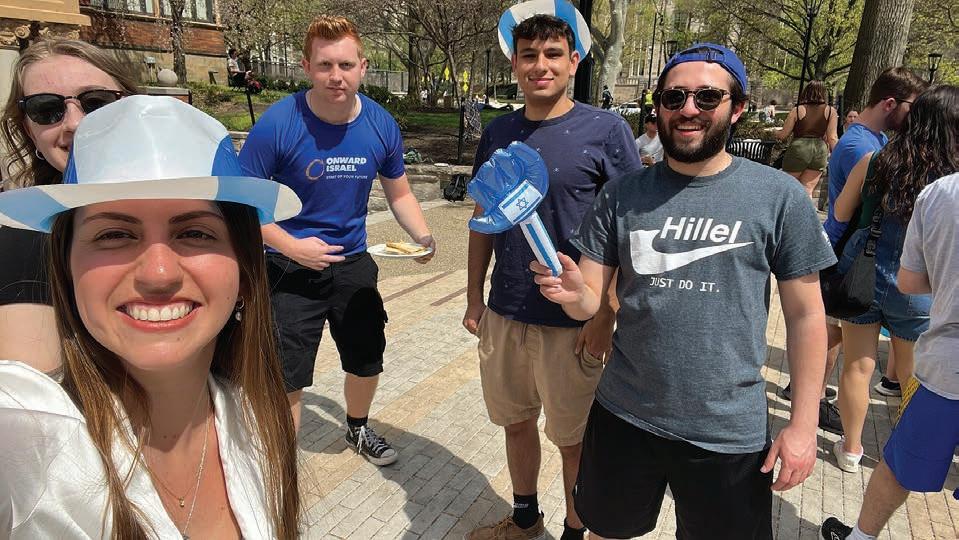
PITTSBURGHJEWISHCHRONICLE.ORG PITTSBURGH JEWISH CHRONICLE MAY 5, 2023 23
Eat, enjoy, learn, repeat.
Photo courtesy of Chabad House on Campus
Schenley
Shinshinim coordinator Risa Kelemer and shinshinim Michal Dekel, Shahar Kurland and Bar Zeevi bring the joy and excitement for Israeli dancing in the rain.
Lyria and Zander Crish display their medals after completing the kids run.
More than 100 people participated in the April 30 Run/Walk/Roll Race for Israel.
Runners set off on the Run/Walk/Roll 5K. Photos by Joshua Franzos
The best way to celebrate is with sabich, falafel and inflatable blue and white hands.
Photo courtesy of Hillel JUC
KOSHER MEATS
•All-natural poultry — whole chickens, breasts, wings and more

•All-natural, corn-fed beef — steaks, roasts, ground beef and more
•Variety of deli meats and franks
Available at select Giant Eagle stores. Visit gianteagle.com for location information. Available at and
Chicken
44 9 lb.lb.
Price effective Thursday, May4 through Wednesday, May 10, 2023
24 MAY 5, 2023 PITTSBURGH JEWISH CHRONICLE PITTSBURGHJEWISHCHRONICLE.ORG
Empire Kosher Fresh Whole Frying


































 By Jacob Magid | The Times of Israel
By Jacob Magid | The Times of Israel















































































































































